A book report, also known as a critique or review, is a written document that describes or evaluates a piece of fiction or non-fiction.
They are typically assigned to students to demonstrate reading comprehension and persuasive writing abilities. They differ in their scope, with some requiring a simple plot summary and others requiring a critical perspective that analyzes themes, characters, or symbolism in a story.
As great books offer a new perspective on the world, book reports frequently ask students to take a certain stance on the writing. For example: “What statement does The Outsiders by S.E. Hinton make about the lives of teenagers?” The ones assigned to students of lower grade levels may not require them to express their opinion on the book, but all of them start with introductory paragraphs that state basic information like the title and author.
Book Report Templates
For grades 1-2
Here are the templates that can specifically be used for grades 1 and 2:

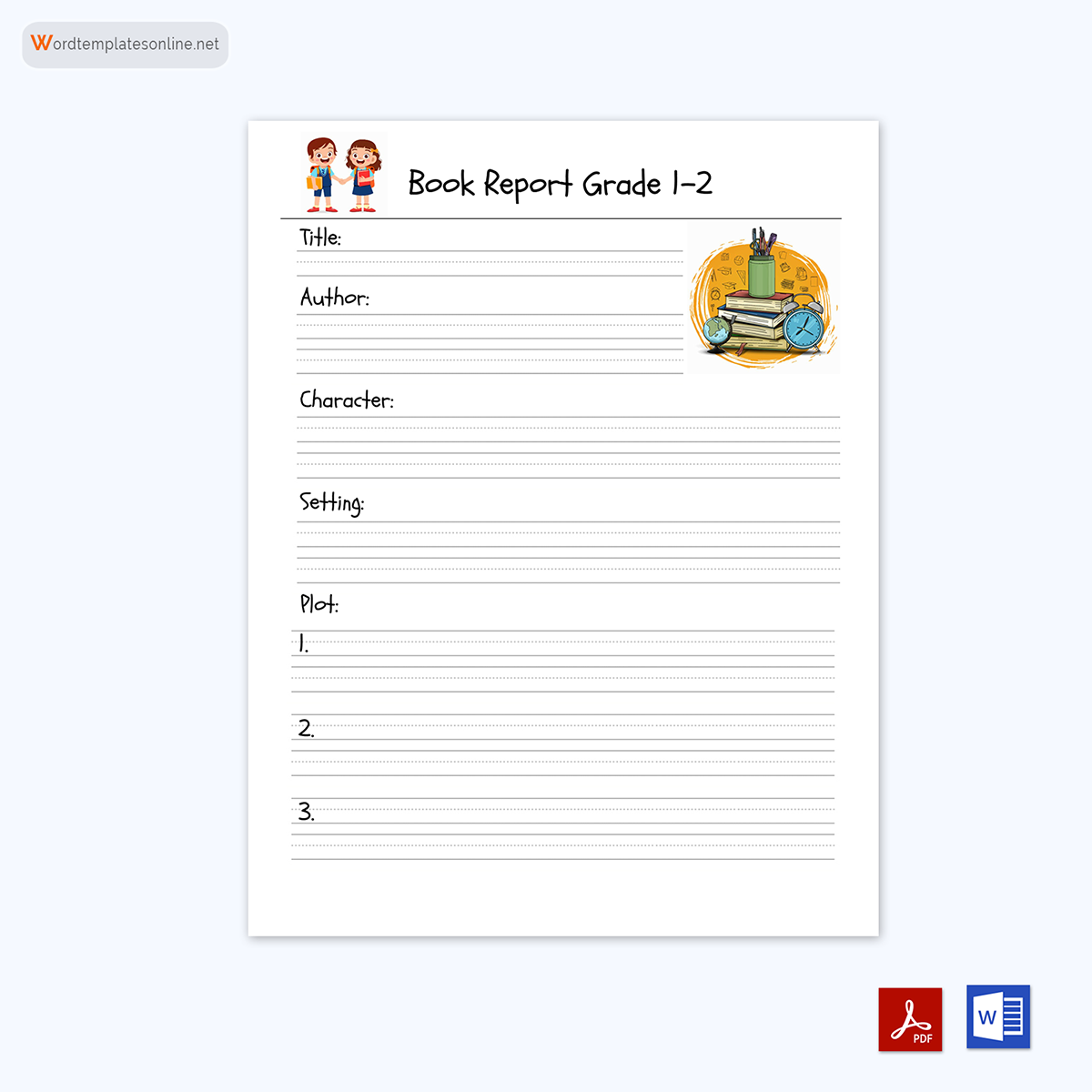
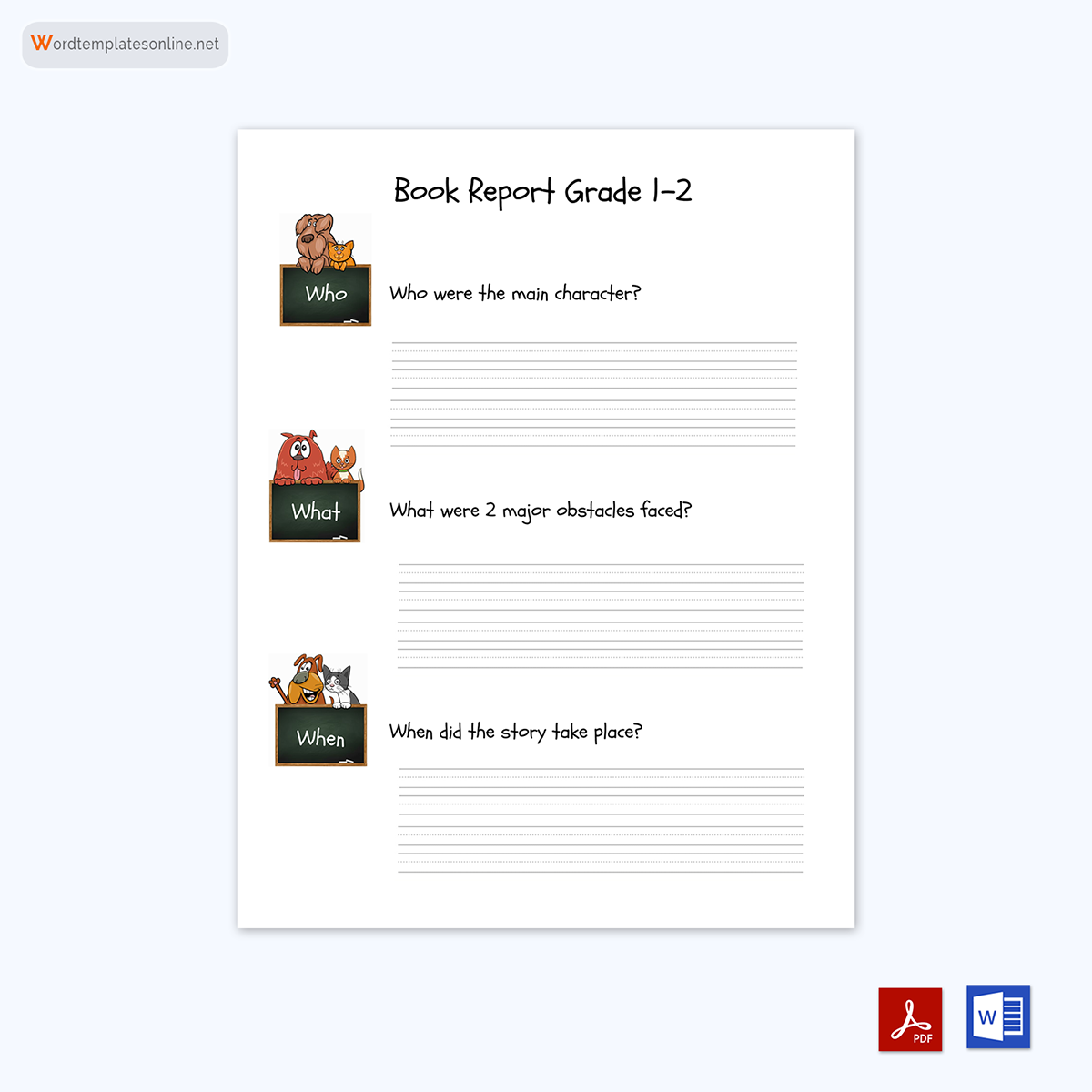
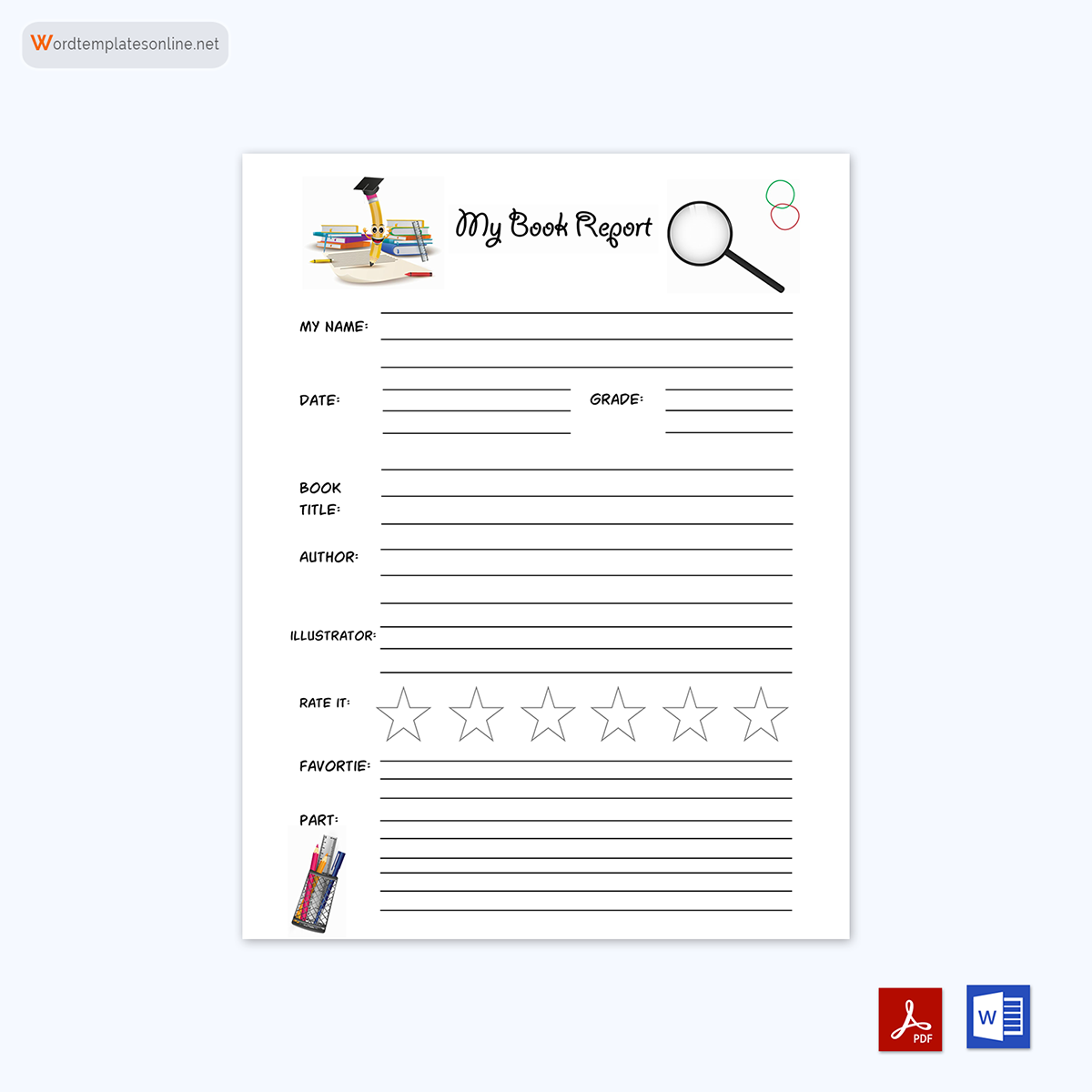
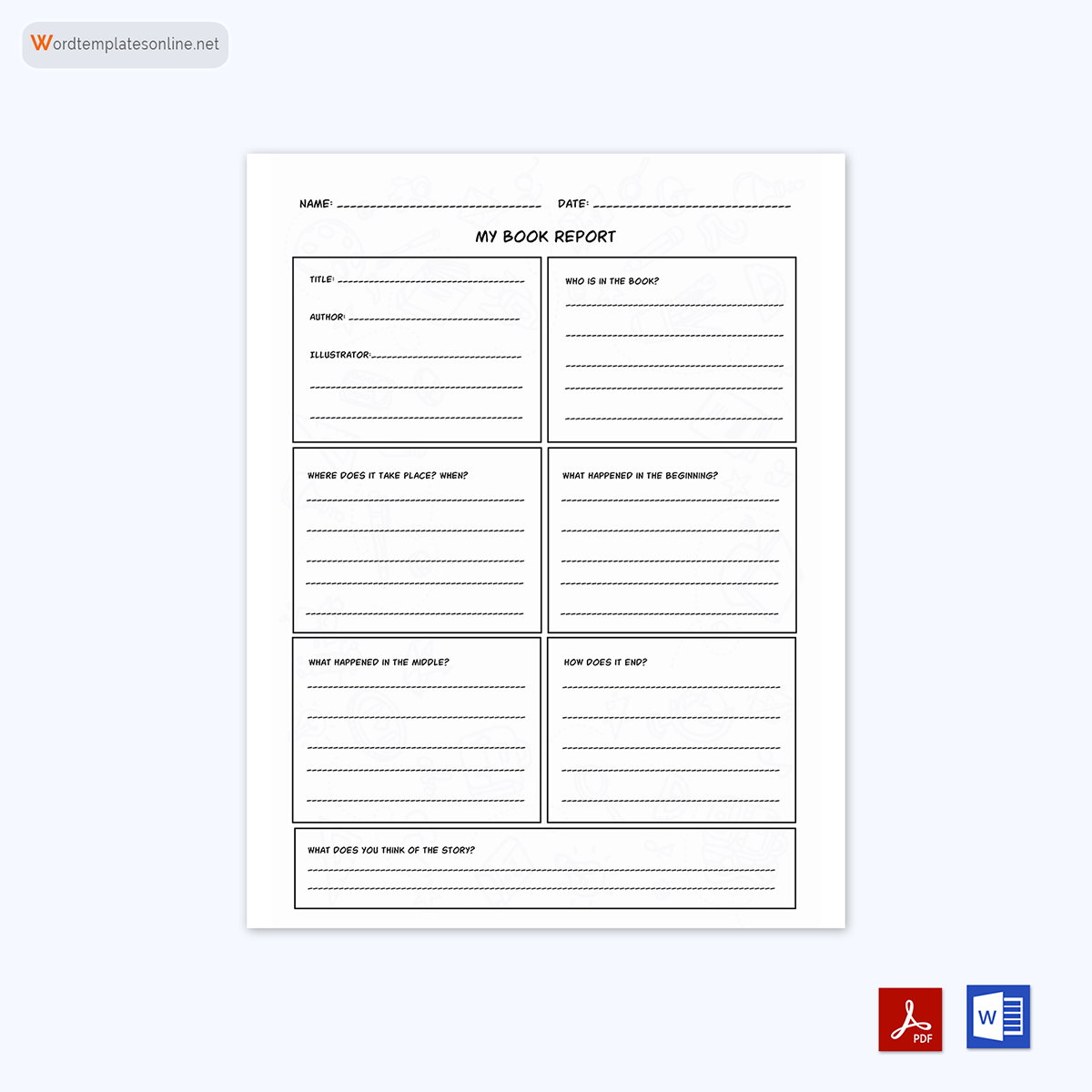
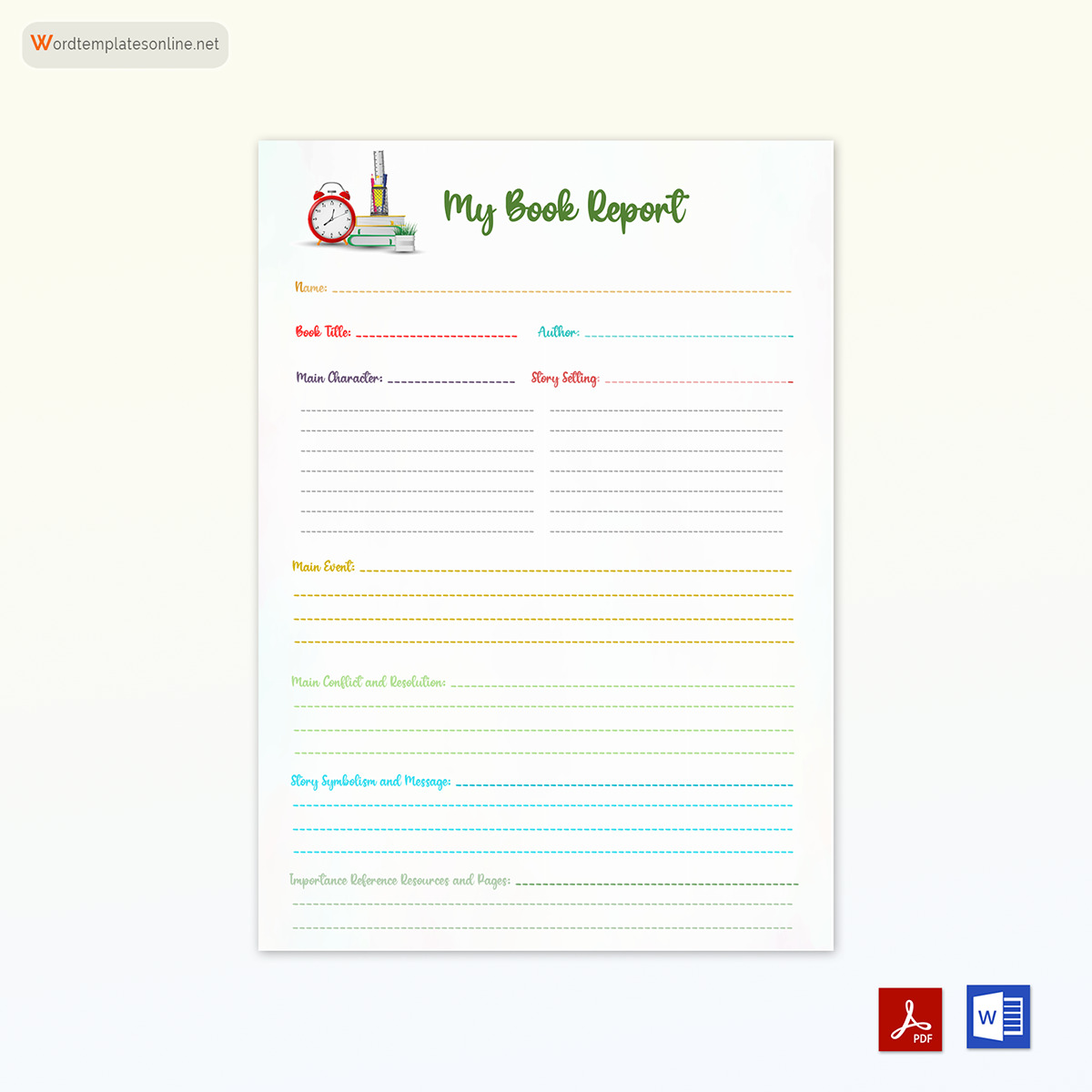
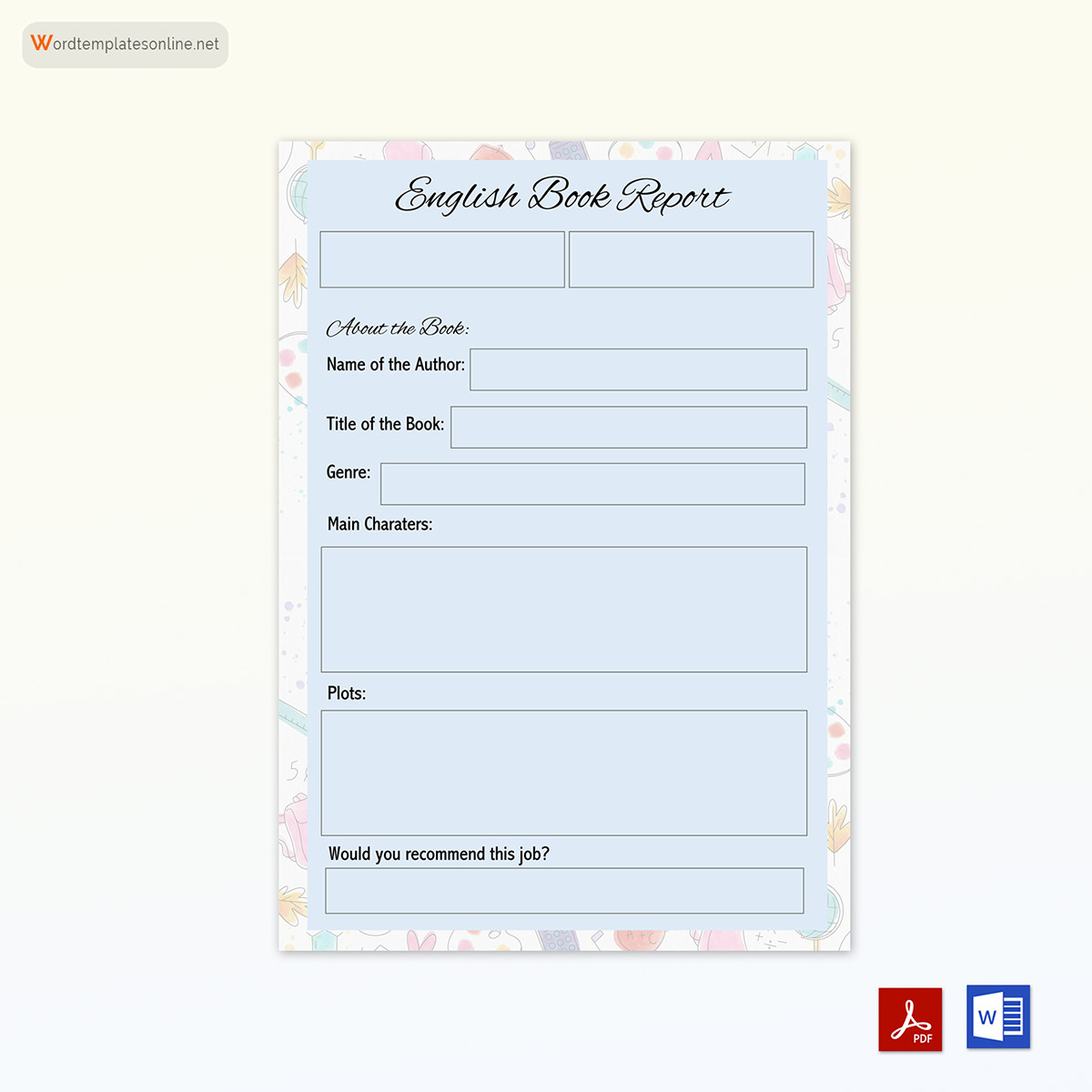
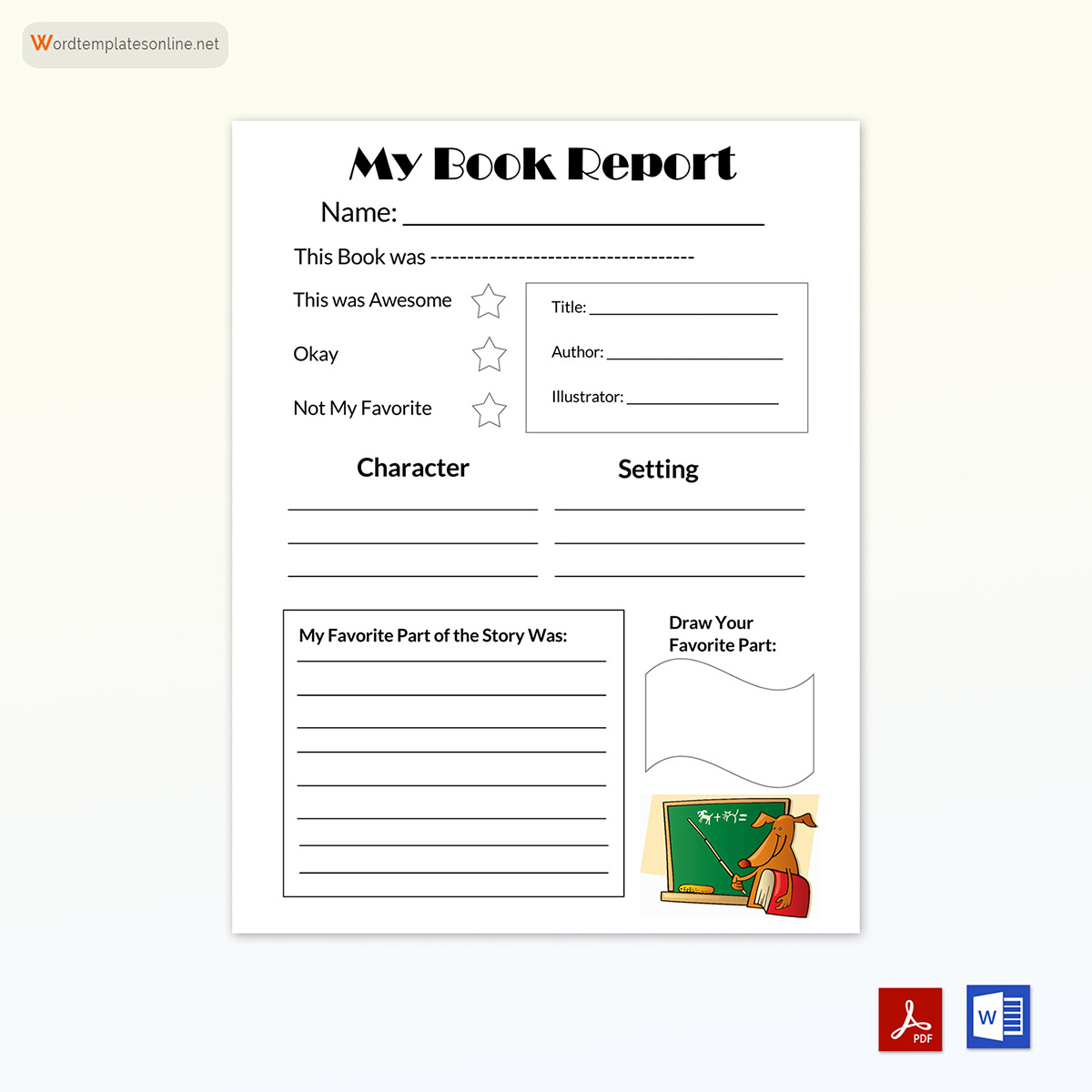
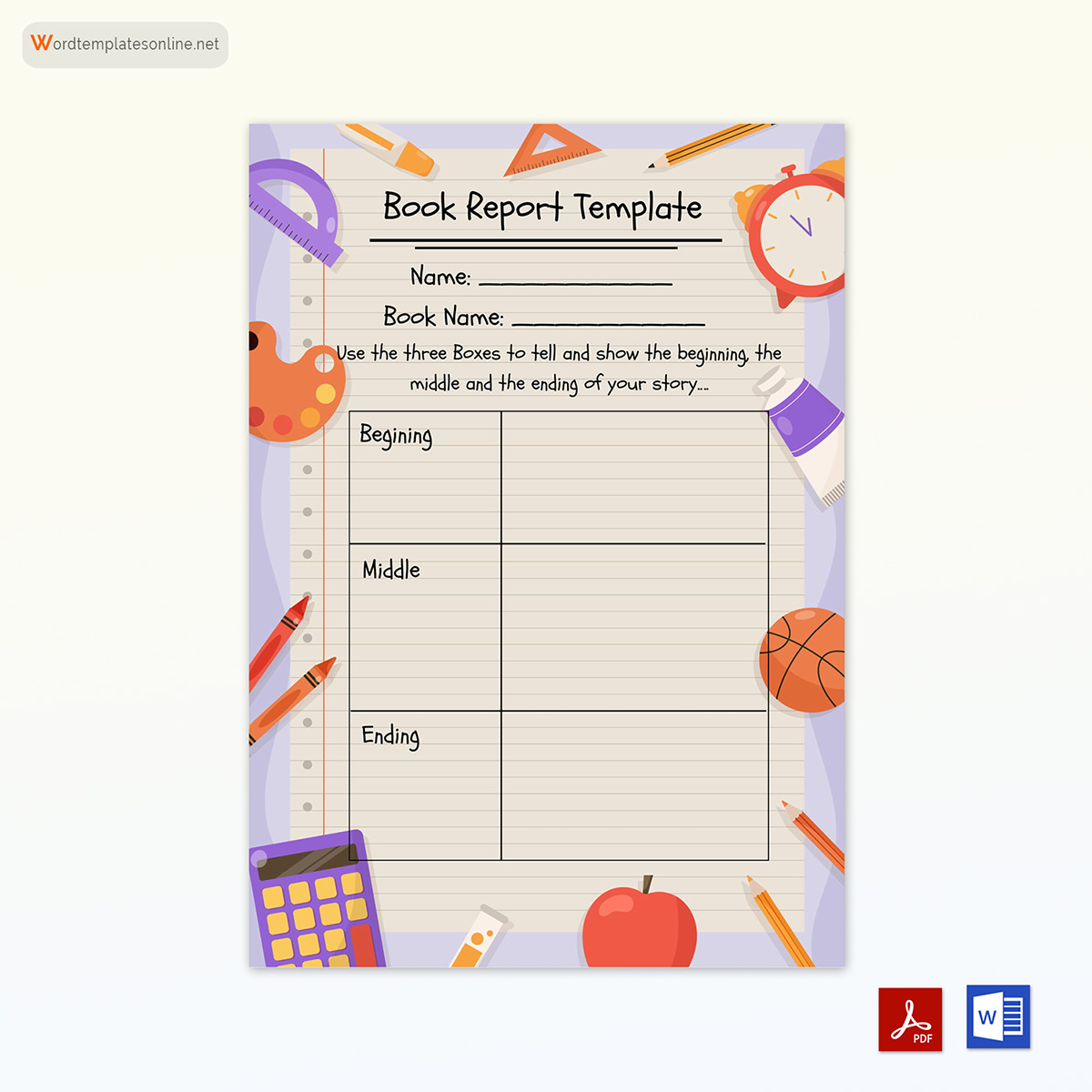
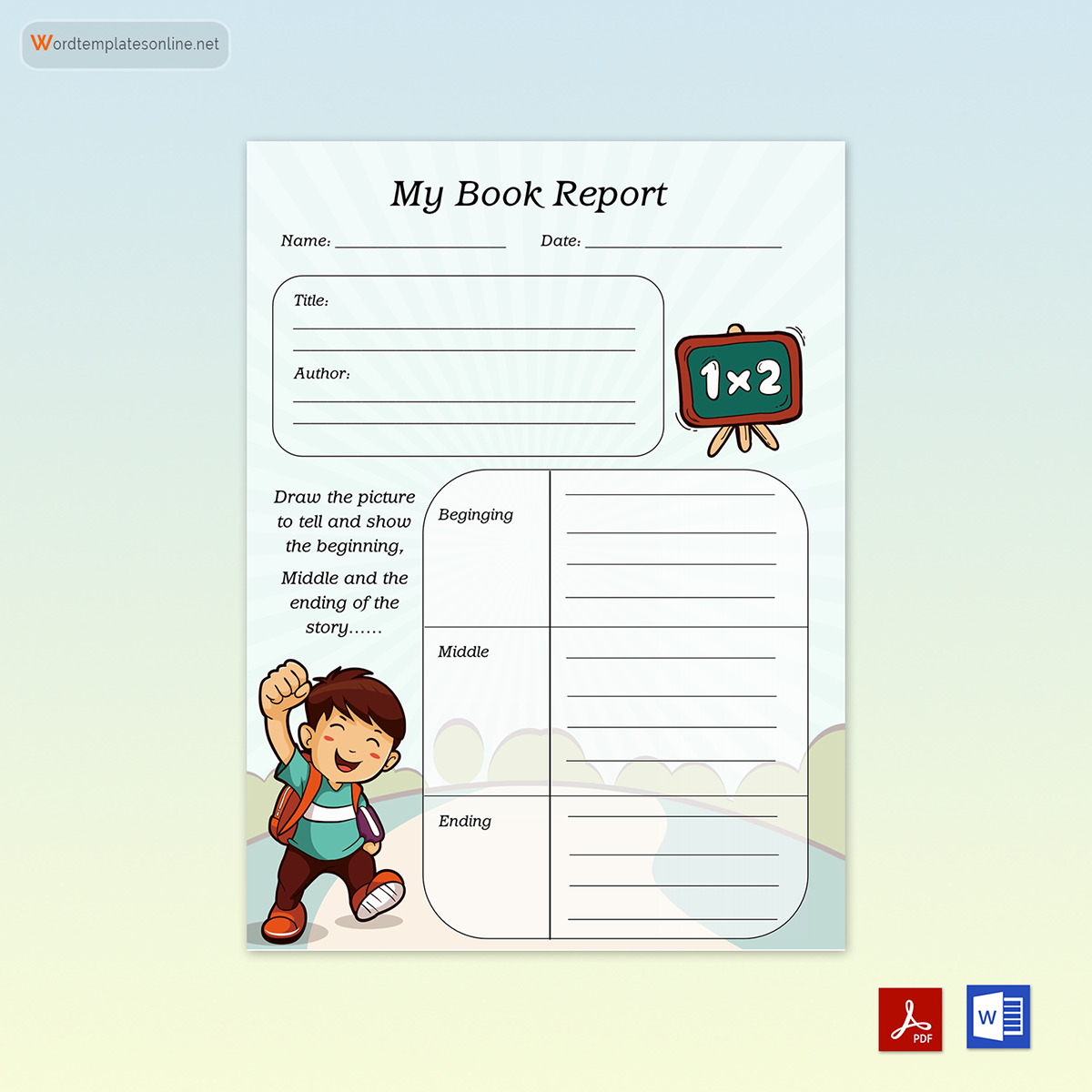
For grades 3-4
For grades 3 and 4, the templates and examples are as:
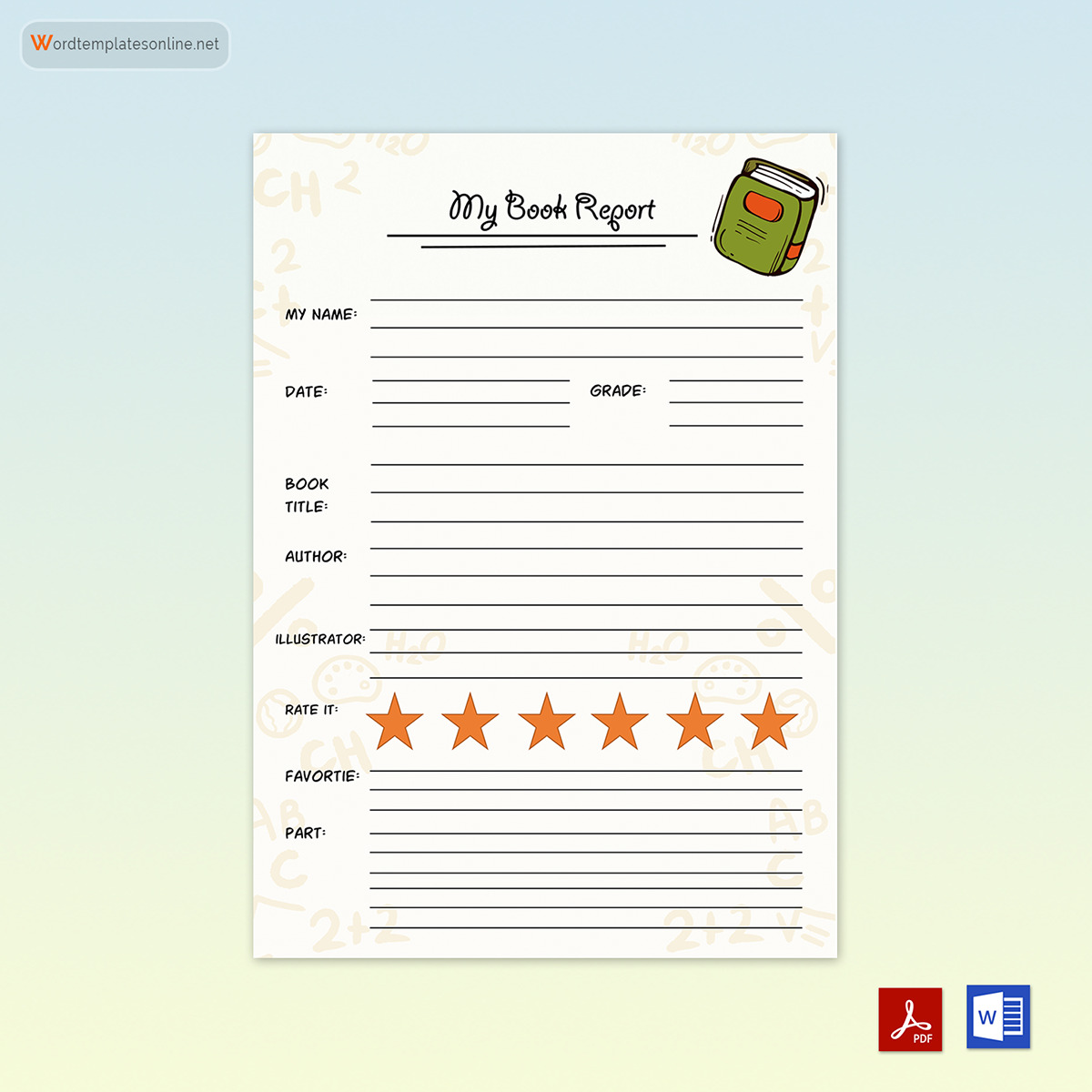
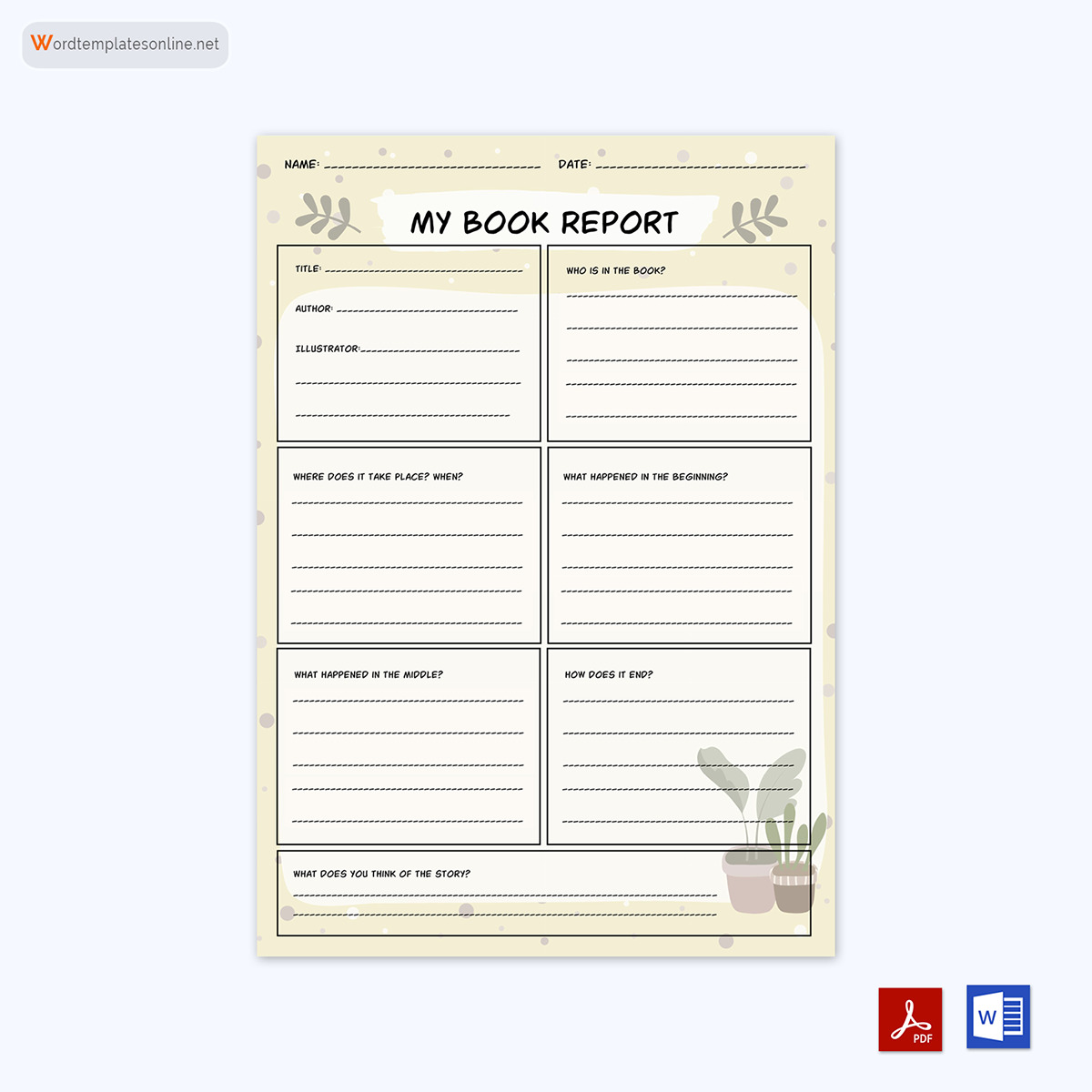
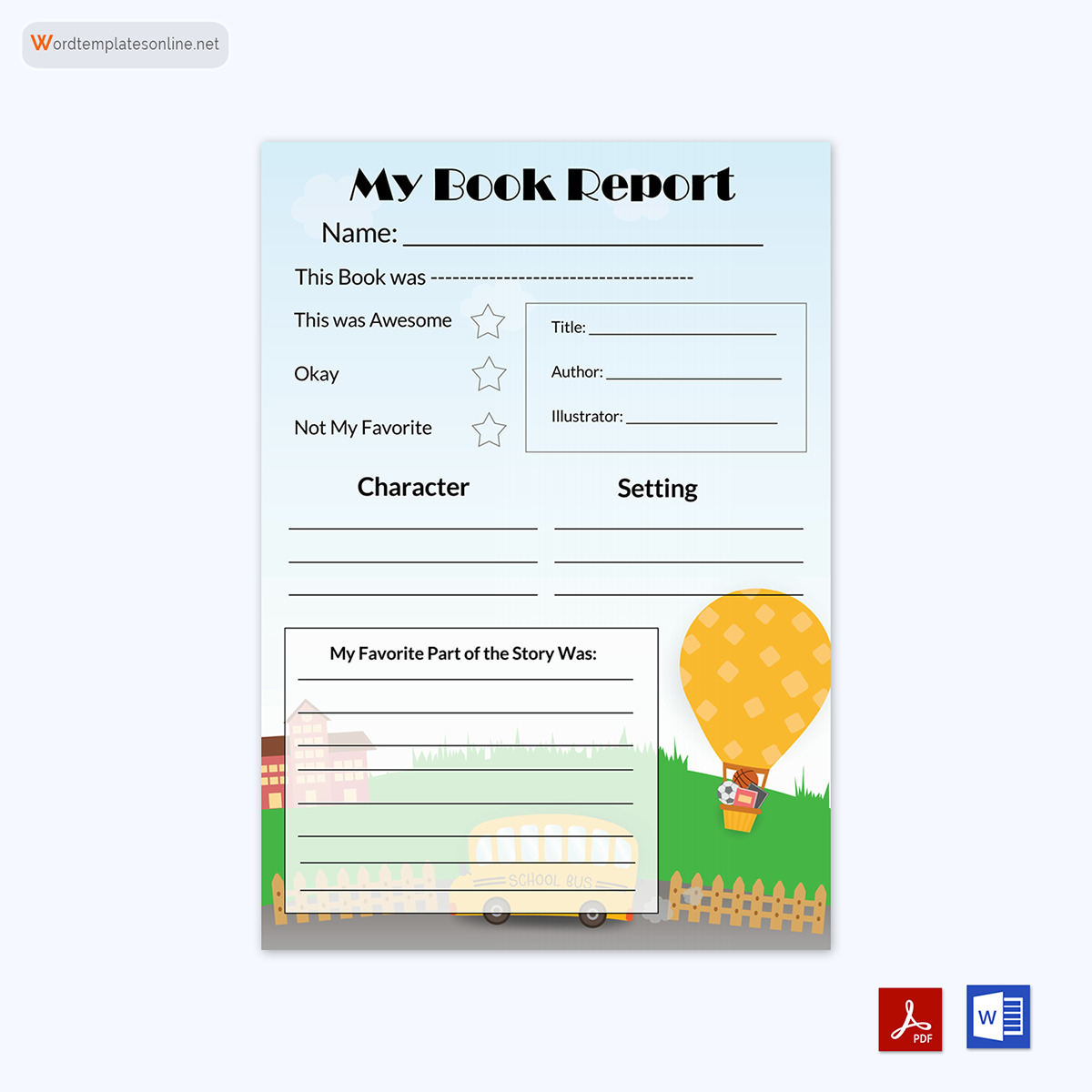
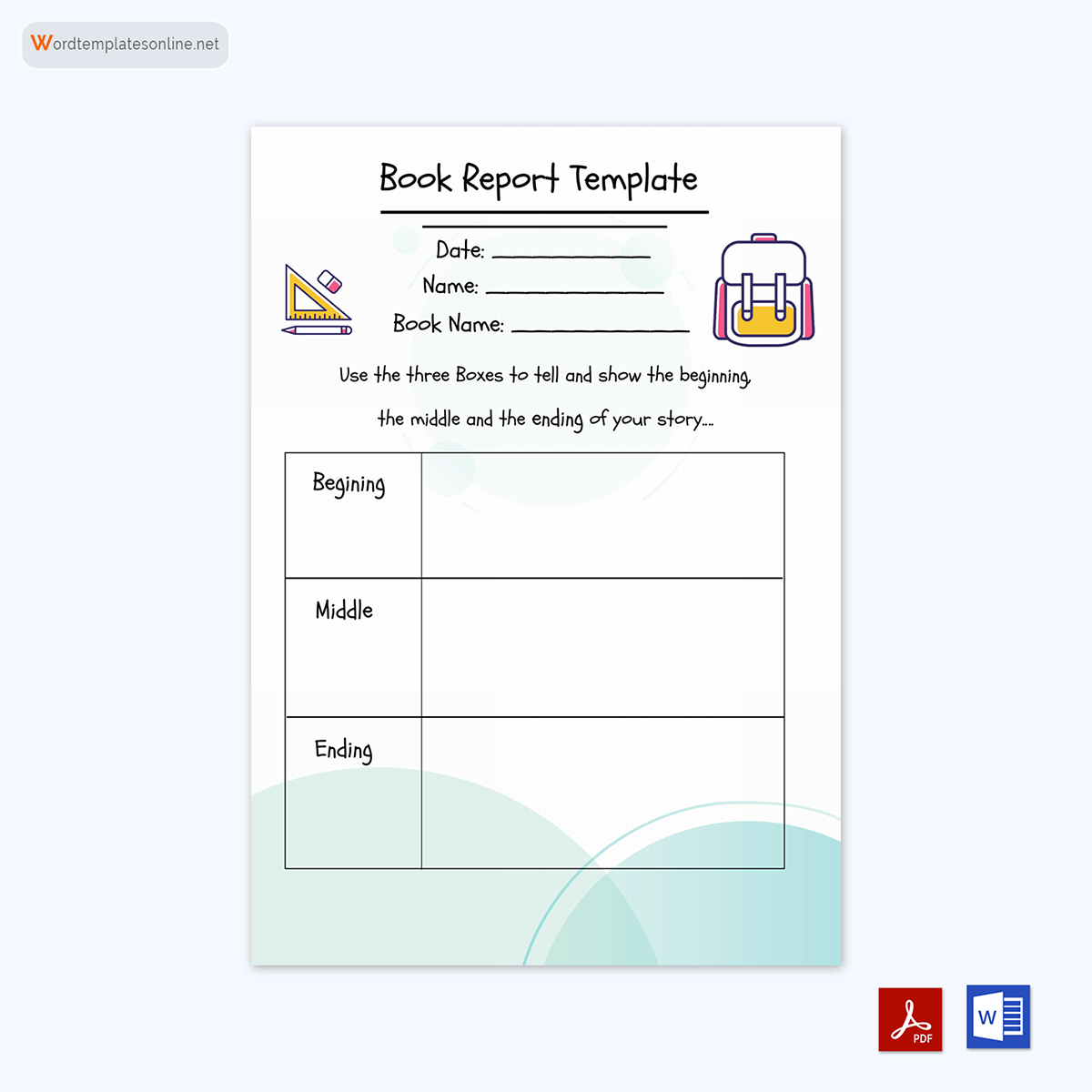
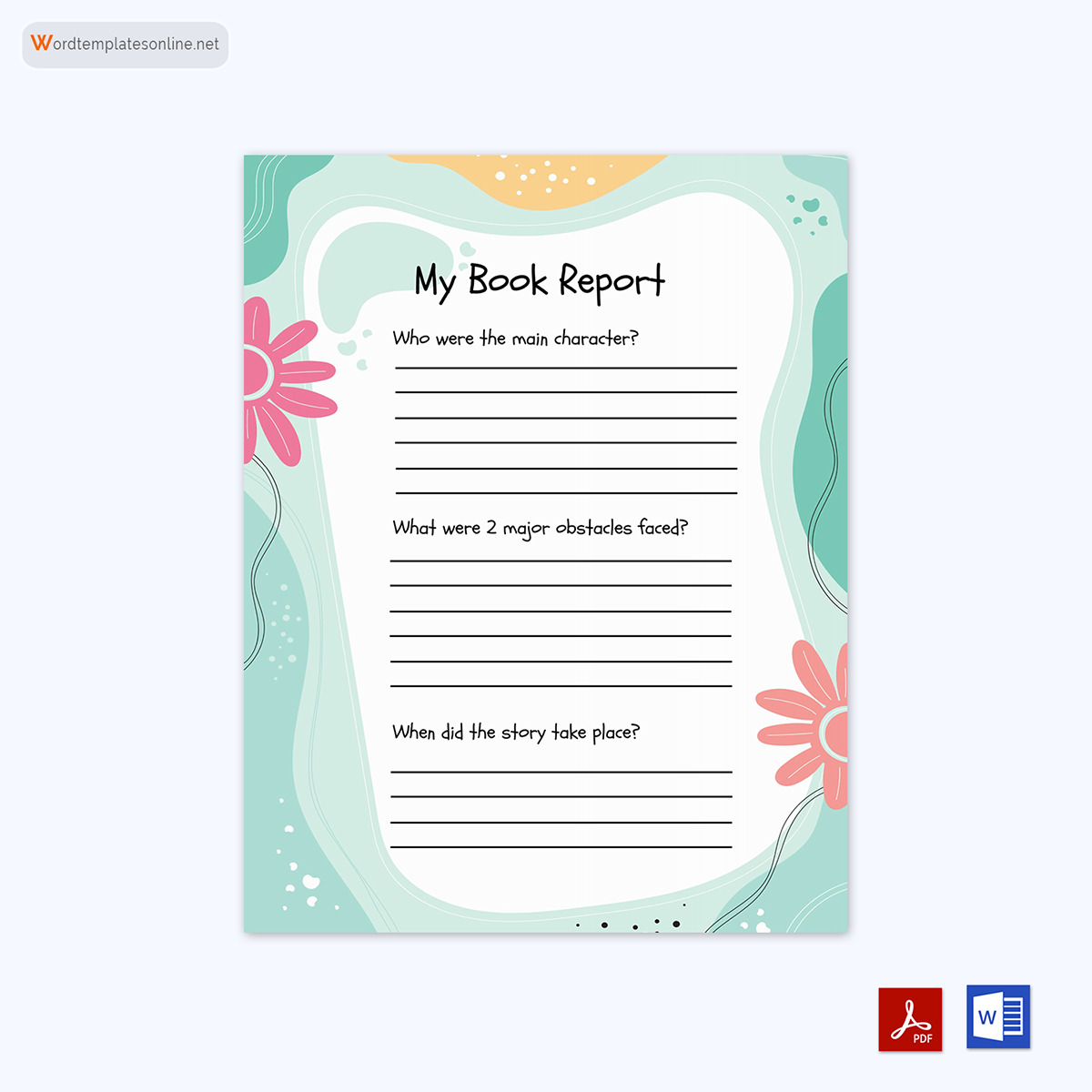
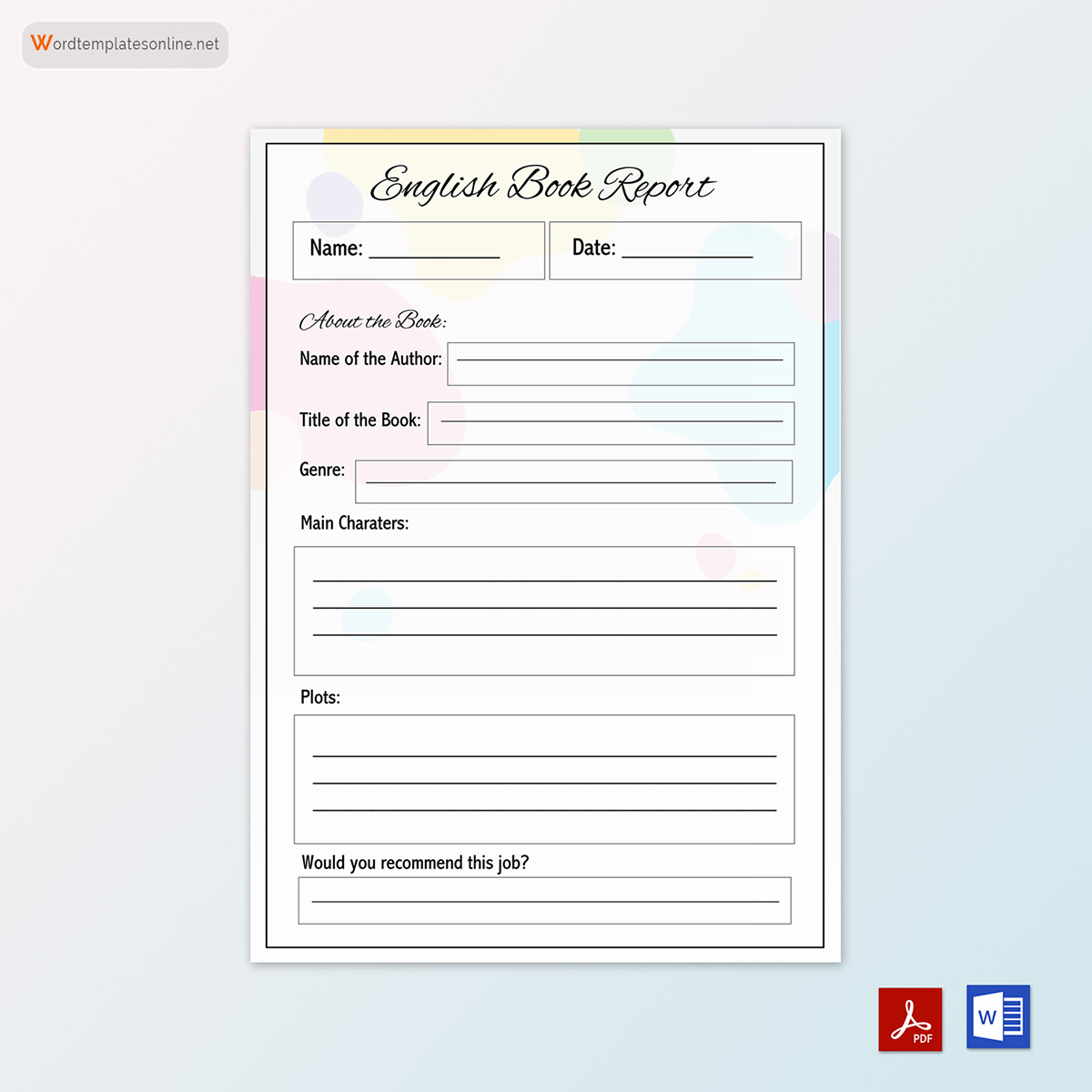
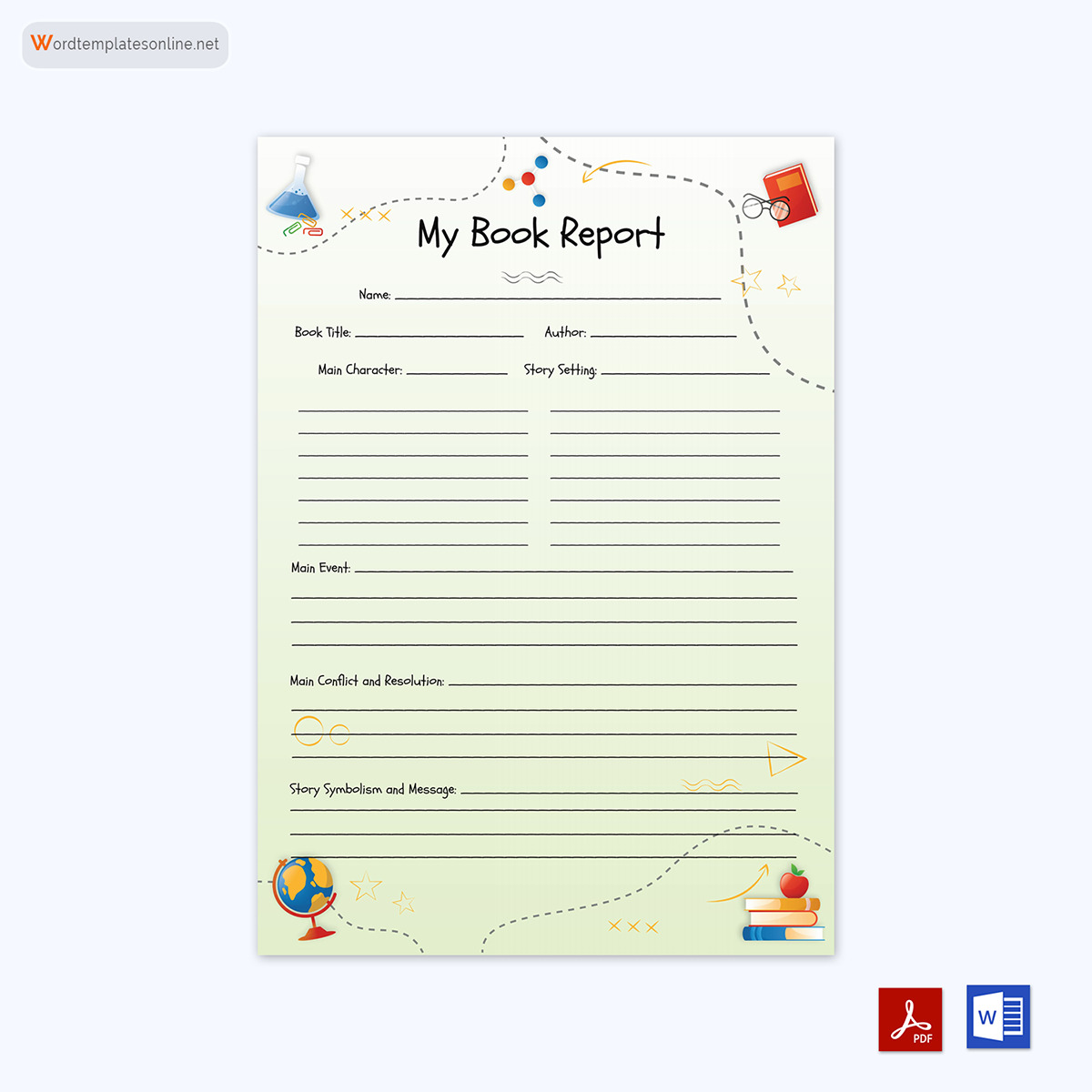
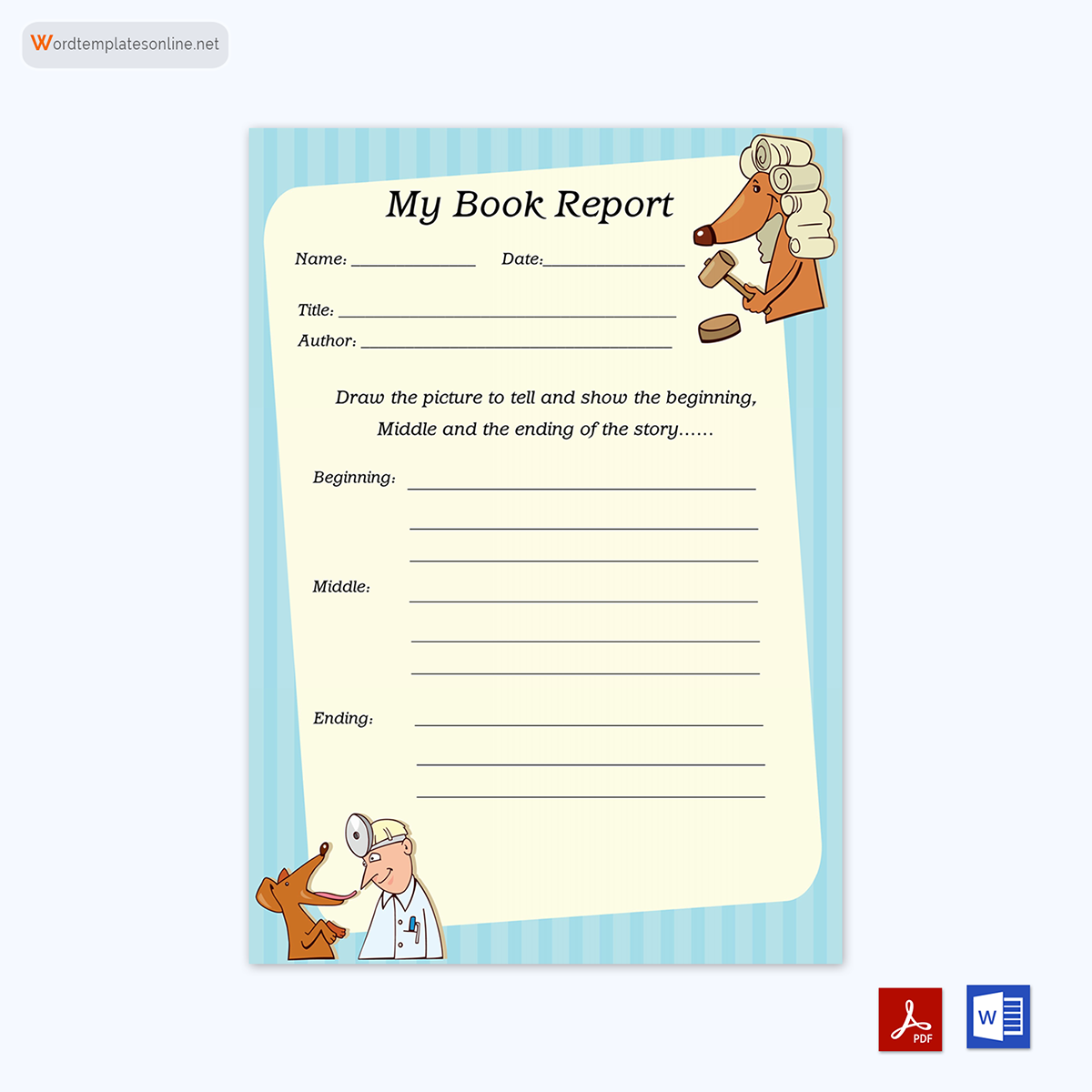
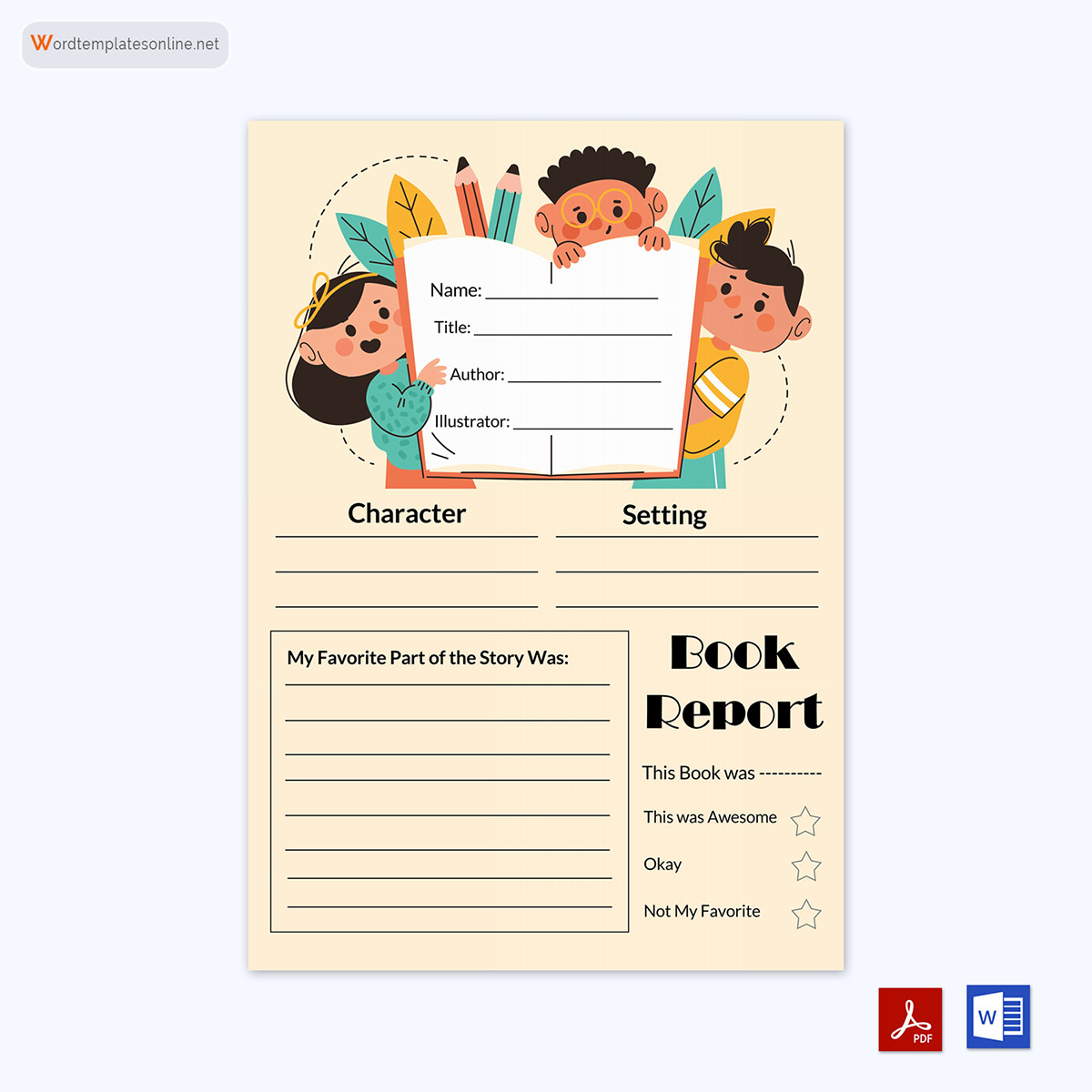
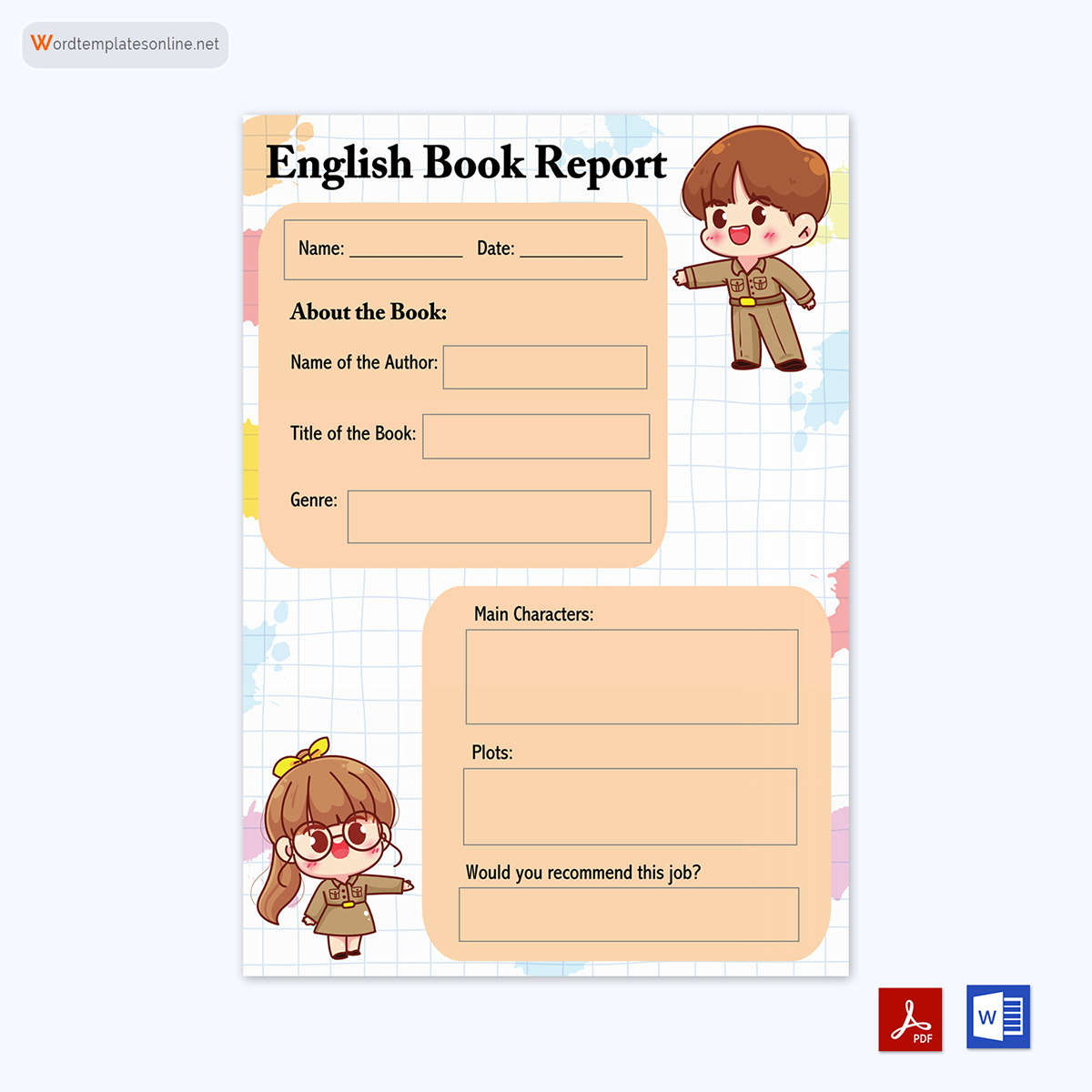
For grades 5-6
Following are the templates that can be used by the teachers or students of grades 5 and 6:
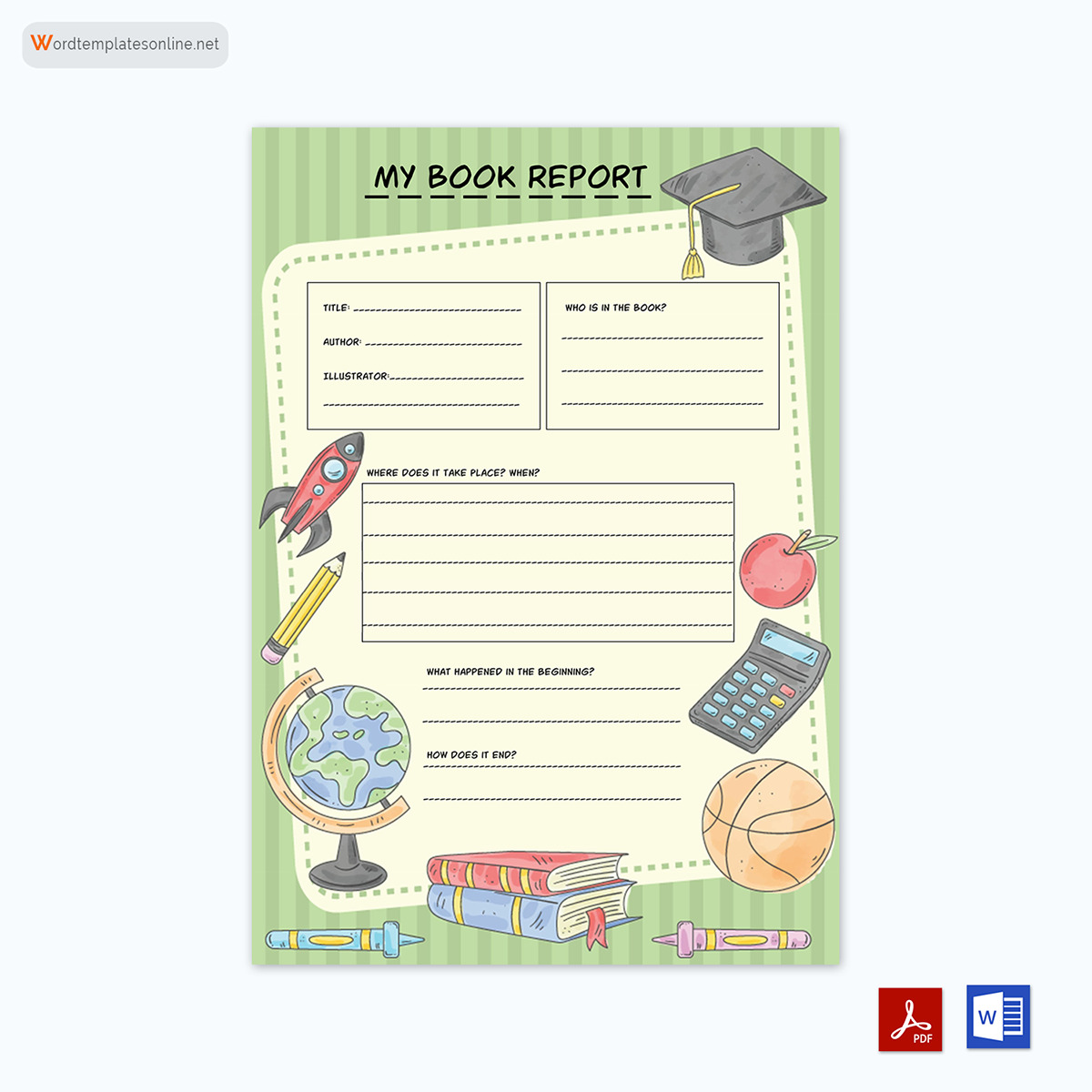
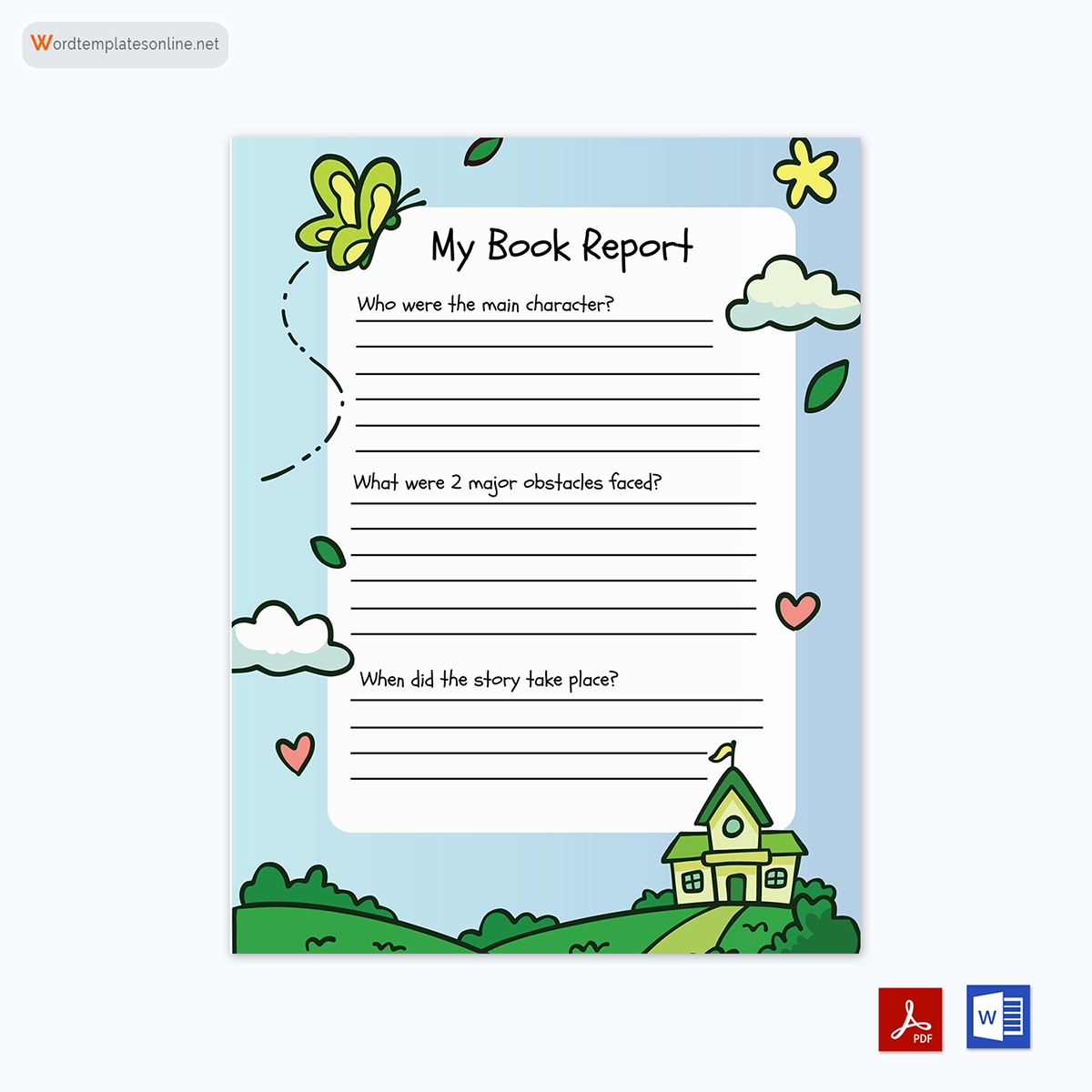
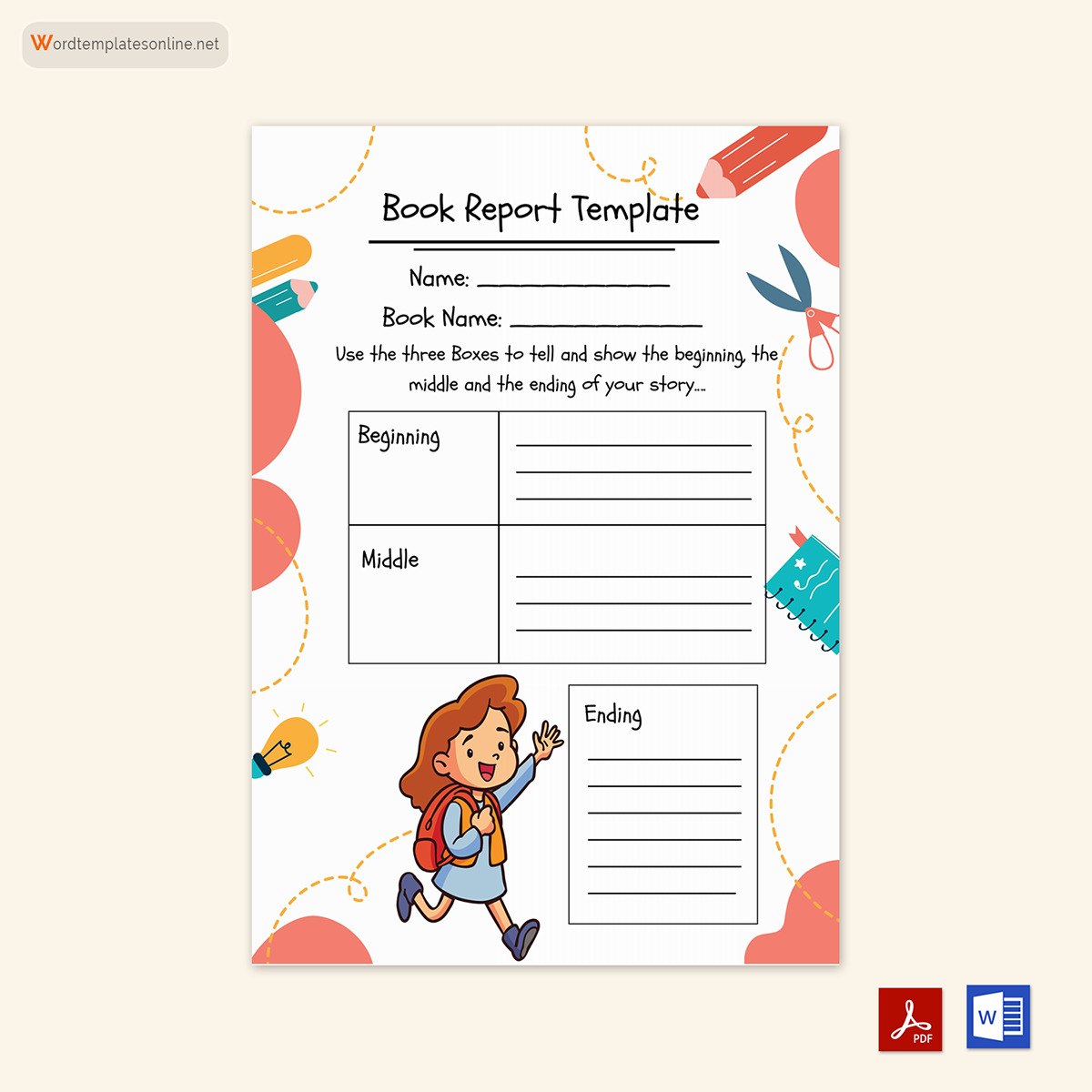
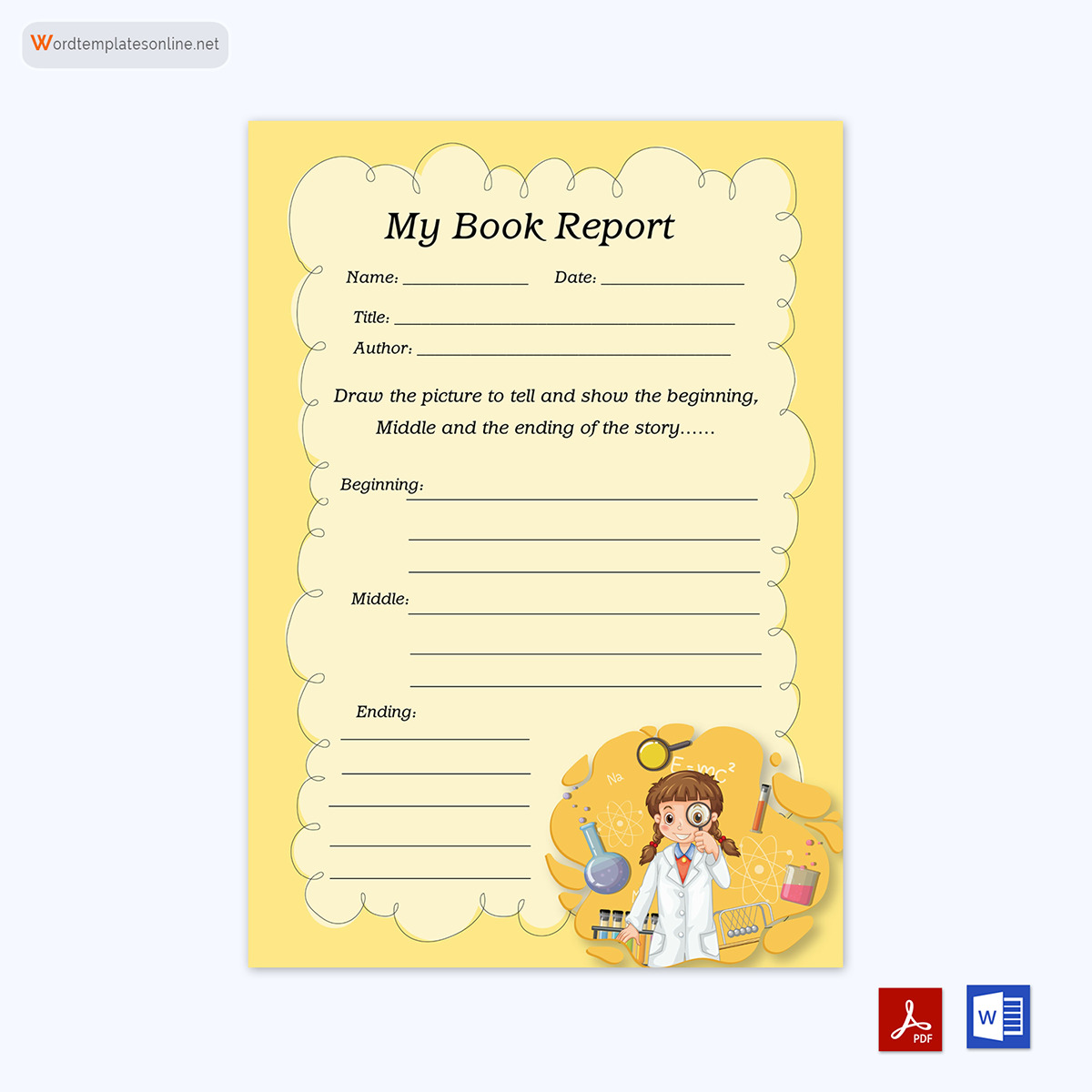
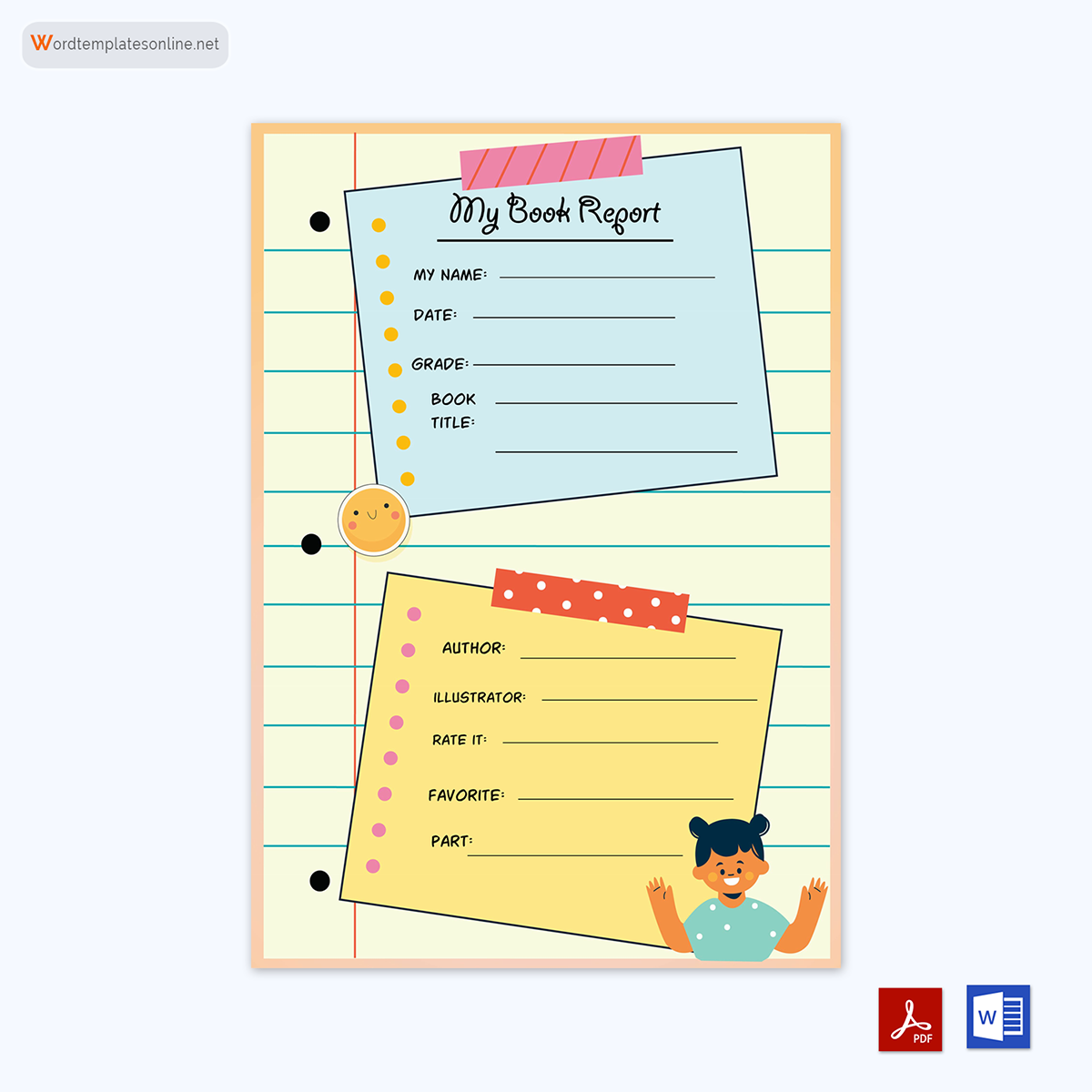
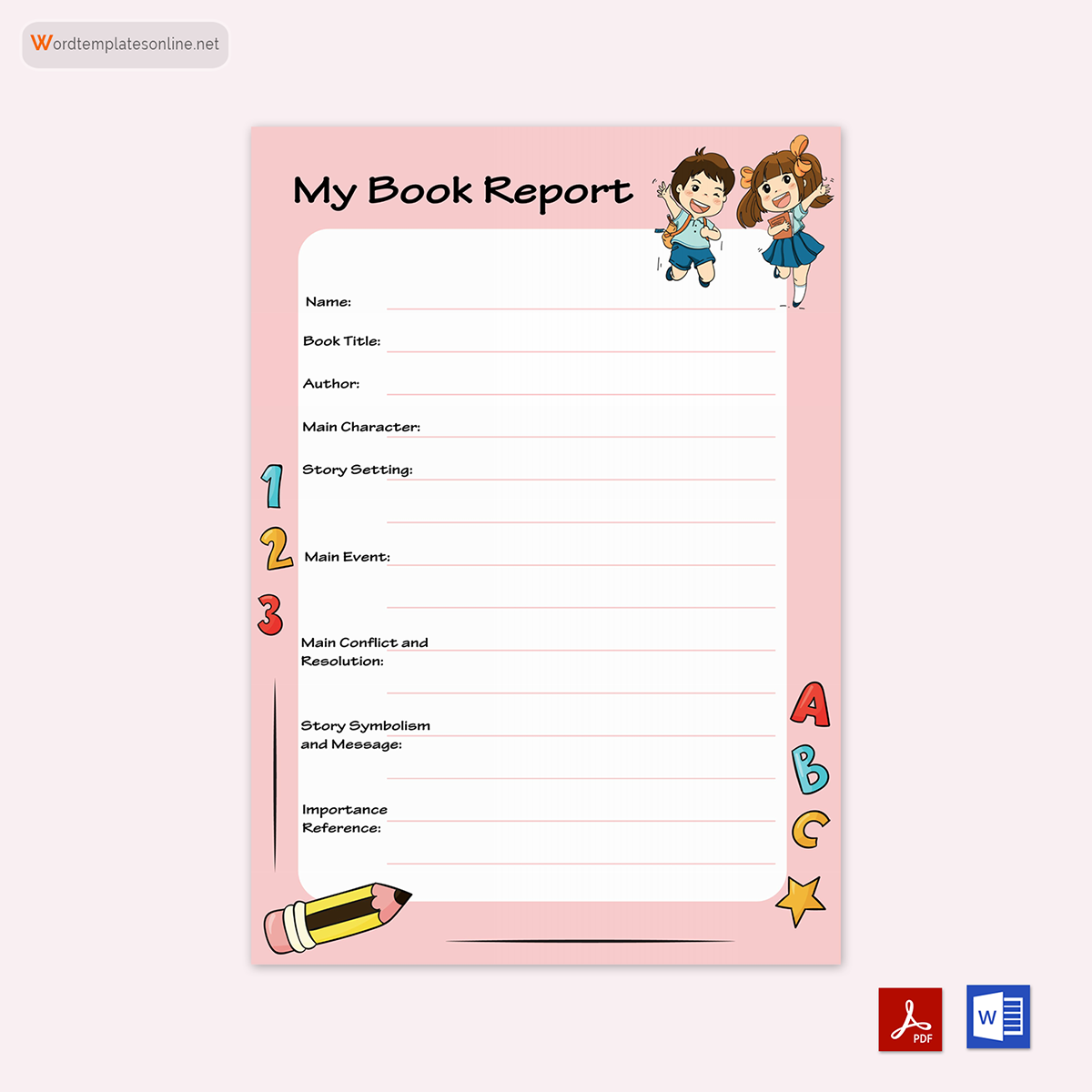
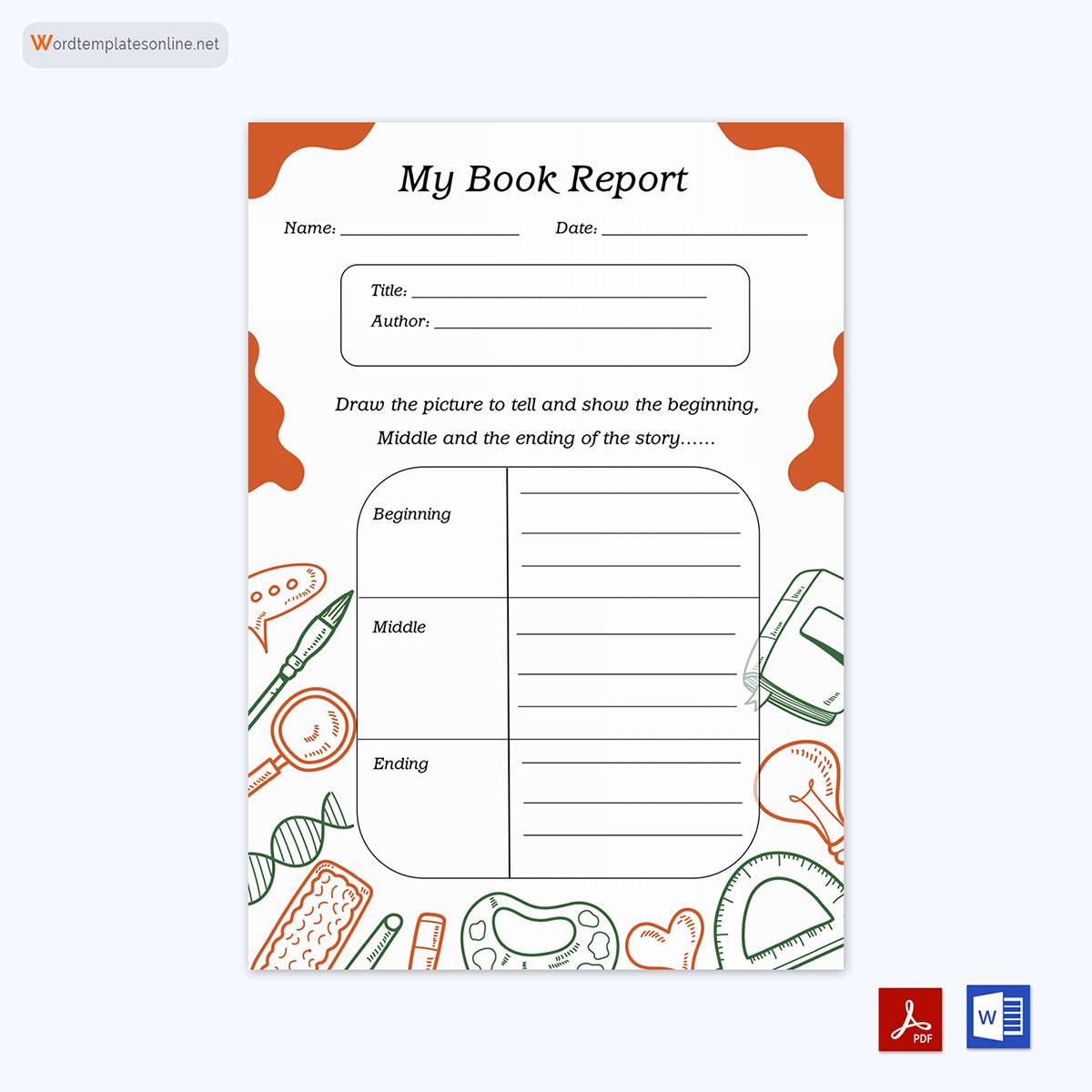
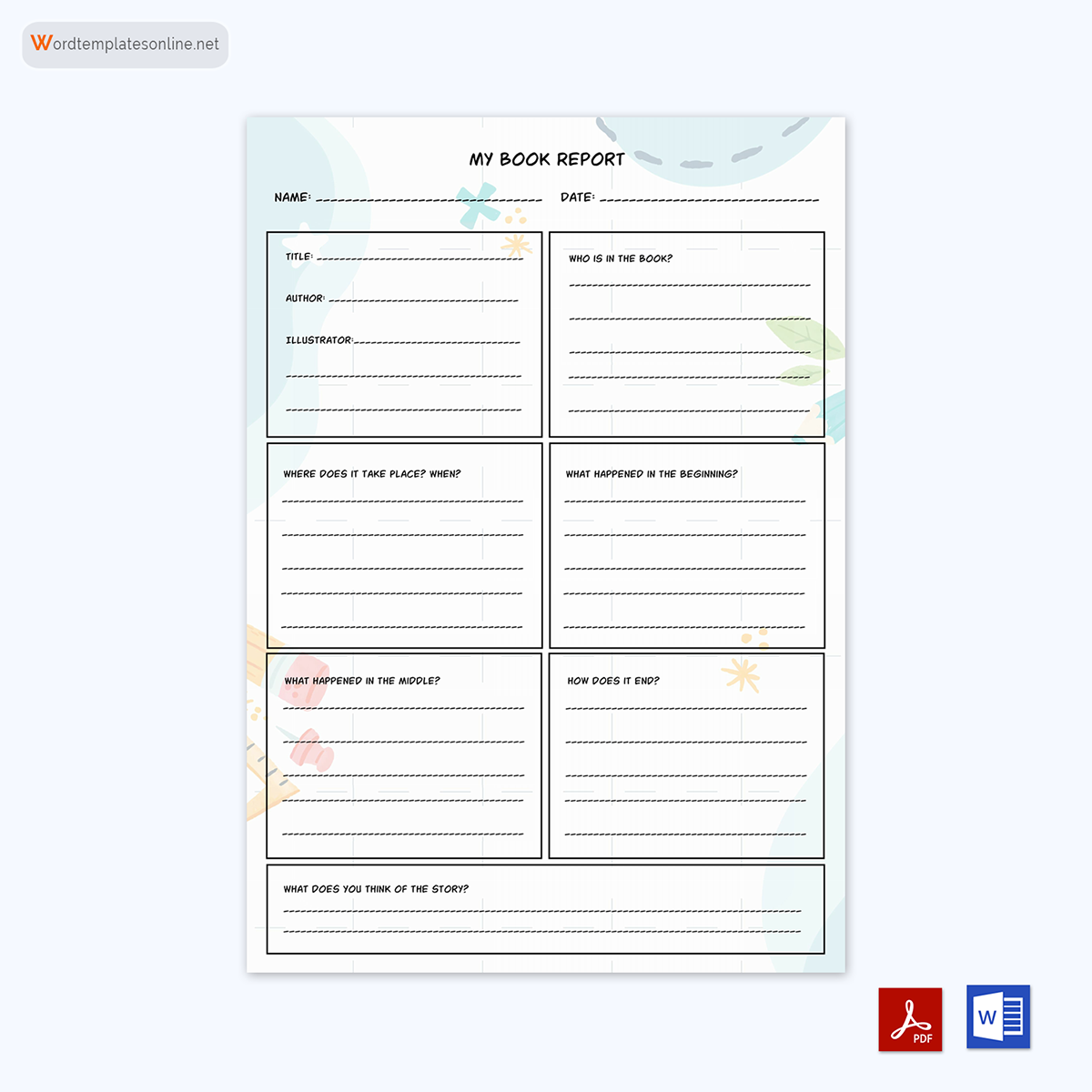
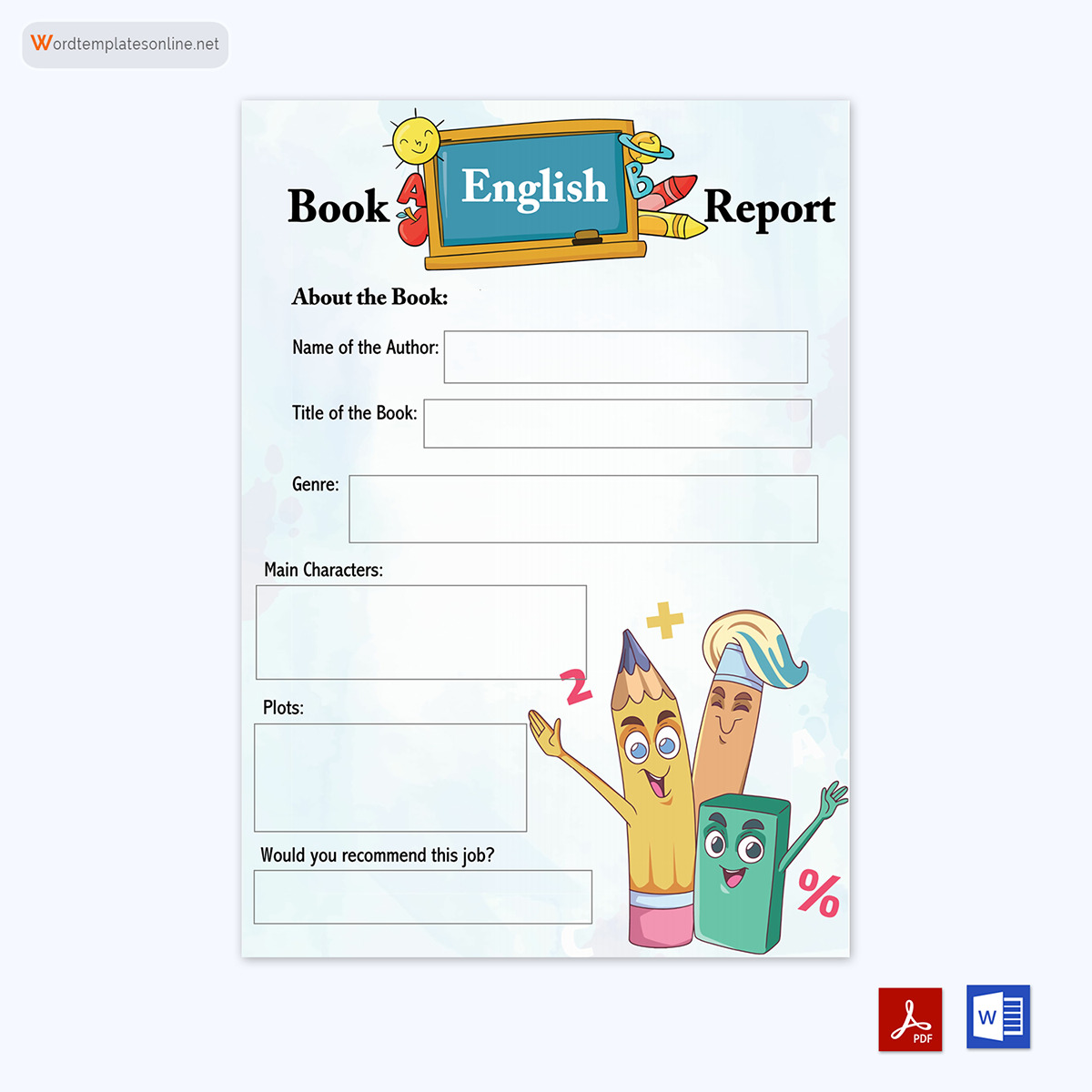
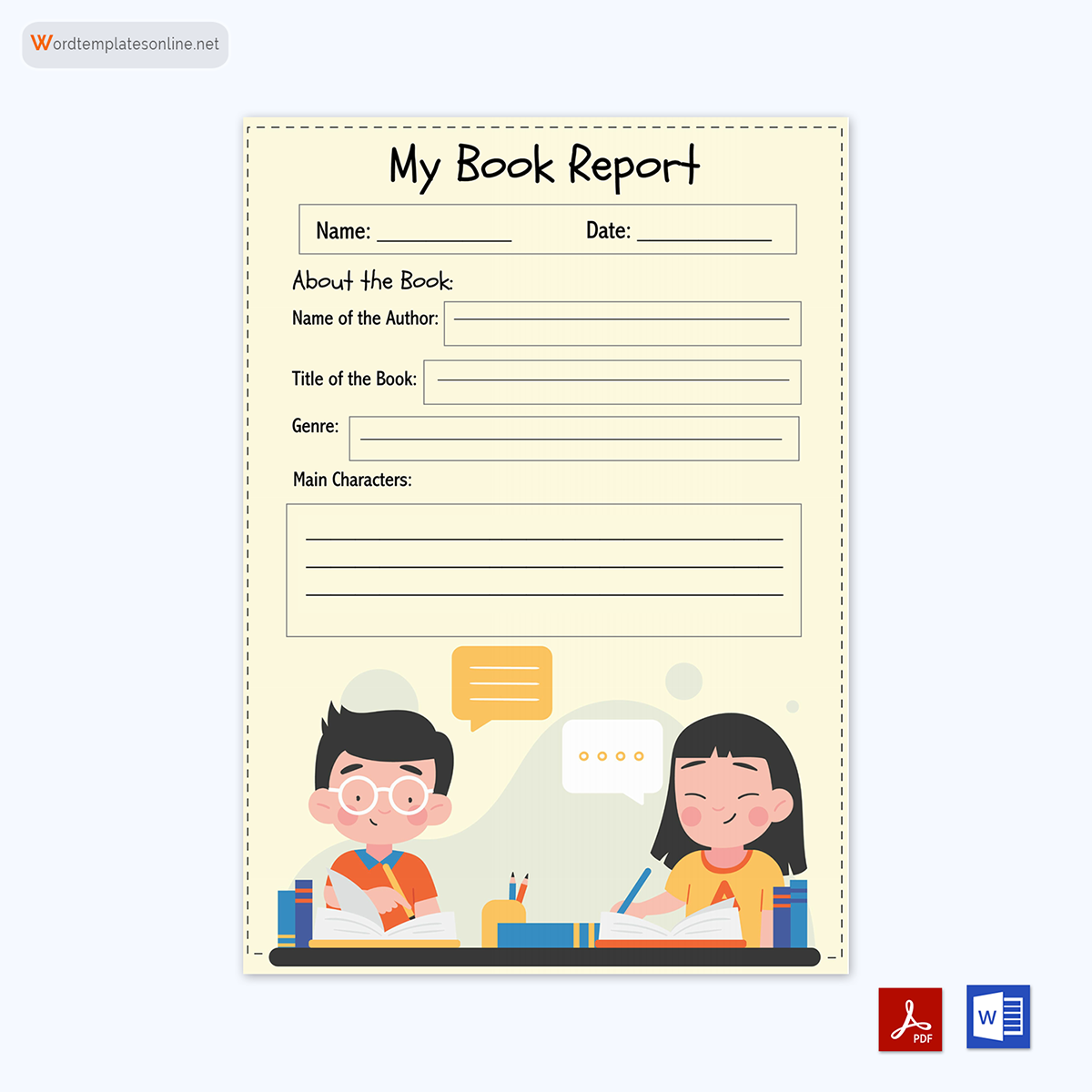
Pre-Writing Considerations of a Book Report
Preparing your ideas before starting can make writing a book report easier and help you save time. So be sure to complete the tasks below before beginning your report to maximize your efficiency and quality of work:
Identify your objective
Your objective is the main statement that you will make in your paper. This statement often answers an assigned question or gives a specific point of view on the story. All of your writing will stem from this objective, which is why it is essential to have it in mind before starting the report. It would be best to choose your quotes and examples according to what will support the point you are arguing in your writing.
Review the rubric
Rubrics or assignment sheets are often provided for students. They outline important information, such as questions to answer, formatting information, and how you will be scored. Reading the rubric before starting the writing process is essential in ensuring that your report caters to your teacher’s expectations.
Read the book
It’s imperative to read the book that you are writing an essay about. However, if you have a choice, try to find a book you think you’d like. While it may seem like a good idea to read an online summary instead of the book, you will probably miss the details you’ll need to support your arguments or observations in the report.
Keep stationary when you read
As you read, have paper and writing utensils at your side to record the page numbers of any quotes you find essential. Alternatively, use sticky notes to mark any valuable passages. If you are reading electronically, there is likely a highlighting or annotating feature to help you document important passages. This will save you the time of flipping back through the book to find examples to use as evidence later.
Look for themes
Themes are the main messages of a story, for example, “the ineffectiveness of revenge.” They can help you make a statement about the meaning and impact of a story in your report. Depending on the assignment, you may write personally about how the themes affected your reading experience. When reading, take note of any themes you encounter. Additionally, keep an eye out for symbols.
Symbols are objects, people, and circumstances featured, often repetitively, in a story that represents an idea beyond their literal contributions to the book. They can clue you into broader themes. For example, the poison used to kill characters may also suggest the poisoning of the mind metaphorically.
Consider your audience
Who will read your paper? Most of the time, the answer is your teacher or other students. However, sometimes you will be asked to write to an imaginary audience unfamiliar with your book, and your goal may be to persuade them to read it. In this case, you mustn’t spoil the book’s ending. Overall, it’s essential to clarify what information or perspective you want your audience to take away from your report.
Craft a rough outline
Create a basic outline using the objectives, themes/symbols, and quotes or examples you noted while reading. For your first draft, the focus is on the logical organization of your ideas. While sentence fluency and grammar will be necessary for the final report, you can hold off on perfecting those elements when crafting a rough outline.
Standard Book Report Outline
As you move from the reading phase to the writing phase, it’s best to use tried-and-true methods of outlining the report. Once you have a good idea of what you will write about, you can plan your paper in a typical five-paragraph format.
This format is based on an introduction, three body paragraphs (unless your teacher asks for more), and a conclusion. The body paragraphs may include a summary of the book and details surrounding the plot and characters.
First, refer to your assignment sheet for the specific content that should be included. Then, take your ideas from the planning phase and sort them into body paragraphs to create a helpful outline.
How do I Write a Book Report?
Information should flow naturally and logically so that the reader can follow your train of thought and see that your arguments, perspective, ideas, and opinions are well supported.
Include each section listed below to ensure that your paper is both thorough and effective:
Introduction
The introduction includes essential information that will establish to your audience what you are writing about and what points you will argue in the remainder of the paper.
The following elements make up a good introductory paragraph:
Hook
The first sentence of any piece of writing should capture the reader’s attention and persuade them to read further. For a book report, this could mean including an interesting fact about the book or author, quoting a compelling passage, or even asking the reader a relevant question.
Title and author-name
The title and author should be stated within the first few sentences to avoid confusion.
Other basic information
Many essays include additional classifying information about the book, such as genre, publication information, awards, or background about the author.
Thesis statement
Thesis statements are typically only required in high-school and beyond-level reports. These statements summarize the argument you will make regarding the meaning of the text in the body of the report. For example, you may state that literary devices, characterization, and setting contribute to a particular theme in your assigned book.
Summary
Save most of the details for your body paragraphs. Still, an introduction may include basic plot information, such as the setting, the name of the main character, and the general storyline.
Body of the report
The body of the report contains details and explanations that address the topics mentioned in the introduction.
The following sections describe the major elements to include in the body paragraphs of a book report:
Synopsis
Summarizing extensive fiction or non-fiction can be challenging, but luckily, there are many organizational strategies to make it easier. A simple way to organize the plot is by recording the story’s introduction, middle, conclusion, important characters, and setting (including time). You can use this information to form a simple statement.
A popular strategy for one-sentence summaries is to describe the main character, their goals, their obstacle or conflict, how the challenge is overcome, and the outcome.
EXAMPLE
After falling in love with Prince Eric, Ariel is transformed from a mermaid to a human by the sea witch Ursula at the cost of her voice. She agrees to kiss the prince within three days or turn back into a mermaid and become Ursula’s prisoner. After she does not succeed, Ariel’s father sacrifices himself, but Prince Eric defeats Ursula and saves all of her victims.
Make sure your summary includes the significant conflicts and how they are resolved. You may also note the tone (i.e., lighthearted or ominous) and the point of view (i.e., first-person).
For non-fiction, you can describe an event and its outcome. You can also use a bubble chart to place an essential concept in the center that extends out with details and descriptions. Chapter titles can give you a good idea of the significant subjects the author is addressing. It’s also important to consider the author’s involvement in the text and where they are getting these facts. For both fiction and non-fiction, it’s best to prioritize the major plot points or facts. Make sure you can tie your summary to the overall themes of the work.
Character information
Character details are always crucial in book reports, and character analysis is a report on its own. To convey the necessary information about a character, consider the problems they’re facing, their strengths and weaknesses, their dialogue, and how the reader perceives them. Physical and general personality traits may also be included. Above all, be sure that you can use your character observations to explain their role in the story’s action.
Plot details
When describing the plot, it’s important to go into detail, but only when it contributes directly to the points you are trying to make. For example, you may highlight literary devices that illustrate a specific theme of the work. In general, you should focus on the most crucial plot points, like the main conflict and how it’s resolved.
Personal evaluation/analysis
Many book reports require you to either analyze the meaning of the story or give an opinion. Analysis often involves describing a significant theme and identifying the writing elements that help establish the meaning or message. In a non-fiction context, you may analyze the author’s perspective and point out any biases in the text.
If your paper is more geared toward a personal review, you can evaluate the plot. Were you interested in the story? Use specific examples to explain why. Other ways to connect personally include considering how you relate to the characters, what you learned from the story, and the different ways the book surprised you.
Examples from the text
It’s hard to support your ideas without referencing the text directly. Whether you’re paraphrasing or using quotations, it’s important to cite any content taken from the book. The most common citation styles are MLA, which includes the author’s last name and page number, and APA, which includes the author’s last name and publication year. Be sure to include a “works cited” or a bibliography page at the end of your paper along with your in-text citations.
Conclusion
Your conclusion should summarize the points you’ve made throughout your paper. Therefore, it is partially parallel to your introductory paragraph. However, be sure that your conclusion is non-repetitive and doesn’t restate your introduction exactly. The final paragraph can also state your overall impression of the book if you are writing a personal review. For example, you may summarize the strengths and weaknesses of the piece and its impact on you. Finally, for non-fiction works, you can use the conclusion to make a final statement on the quality of the evidence.
Editing and revising
Unfortunately, the work isn’t done once you type your last statement. You will probably need to look back over your essay a few times to spot grammar mistakes and improve sentence fluency. Reading your report out loud will help you determine if your writing flows naturally and detect more errors. It’s also helpful to ask a friend or family member to read it and offer an audience perspective. When editing, check for formatting mistakes. Your teacher likely guided the font, text spacing, and citation style that you should use in your work. Finally, it doesn’t hurt to use a spellcheck program to catch any last mistakes before submitting the assignment.
Final Remarks
Taking the time to jot down ideas and craft a proper outline is key to writing a high-quality book report. The best papers also include relevant details cited in the text. It tests your reading comprehension, your persuasive skills, and your ability to summarize. It often requires you to make comparisons and express different perspectives. No matter how well a student meets these challenges and supports their argument, a sloppy paper full of grammatical errors will read poorly. Therefore, the planning, drafting, writing, and editing/revision stages are vital to crafting a great one.
When you’re prepared, writing a book report is not as hard as it may seem. However, it is often at least a three-day commitment, considering that you don’t have all day to dedicate to the assignment. Using a free template, such as the one provided on this page, can help accelerate the process and ensure that your writing is appropriately organized. With all the above tips in mind, you will be well on your way to high marks and a smooth writing experience.








